
















Enjoy dedicated streaming bundles, uncapped data with no FUP and more.
Uncapped data
20GB streaming data
Unlimited closed user group minutes (Telkom-to-Telkom calls including Telkom landline)
200 Other-network minutes
Unlimited SMS SIM-only R350 Mobile service with mobile device
Uncapped data with no FUP applied to the package. Data access will never be terminated or stopped. Includes WhatsApp.
Naledi packages come with a dedicated streaming bundle for YouTube, TelkomONE app, Facebook, Facebook Messenger, Twitter, Instagram and LinkedIn.
Network-based CUG. Telkom is the only company that can offer this converged voice call solution across fixed and mobile numbers, which will result in significant voice-calling savings.
Telkom Naledi Platinum
Uncapped data
20GB streaming data
Unlimited closed user group minutes (Telkom-to-Telkom calls including Telkom landline)
600 Other-network minutes
Unlimited SMS
SIM-only R500 Mobile service with mobile device
Book a presentation appointment now. Email us: RT15Enquiries@telkom.co.za
State users on top-up options can top up their all-net minutes at the discounted State OOB rate of R0.45 (36% discount).
Full allocation of all package bundles and benefits even if a SIM is activated mid-month. No proration applied as we would do normally.
Event billing and premium-rated events can be blocked at a SIM level, backed by the setting of a zero spend limit.

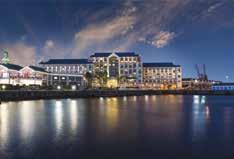

Main image: top right, then clockwise to centre; wind power, Perdekraal East Wind Farm; fruit packaging, RFG; wine bottles, Cape Winemakers Guild; new Ashton Bridge, AECOM; a direct flight between Washington Dulles Airport and Cape Town International Airport has been introduced, United Airlines; wind-turbine manufacturing factory within the Atlantis Special Economic Zone, Gestamp Renewable Industries; the Cape Peninsula from above, TNPA.
Credits
Publishing director:
Chris Whales
Editor: John Young
Managing director: Clive During
Online editor: Christoff Scholtz
Designer: Tyra Martin
Production: Yonella Ngaba
Ad sales:
Gavin van der Merwe
Sam Oliver
Shiko Diala
Gabriel Venter
Vanessa Wallace
Administration & accounts:
Charlene Steynberg
Kathy Wootton
Distribution and circulation manager: Edward MacDonald
Printing: FA Print
The 2023 edition of Western Cape Business is the 16th issue of this highly successful publication that, since its launch in 2005, has established itself as the premier business and investment guide for the Western Cape. The Western Cape has several investment and business opportunities. In addition to the regular articles providing insight into each of the key economic sectors of the province, a special feature focuses on how the province’s Special Economic Zones have the potential to shift the energy debate in the Western Cape. The Atlantic Special Economic Zone is positioning itself as a greentech hub and wants to attract manufacturers in the renewable energy sector and automobile component manufacturers for the electronic era. It is encouraging tenants to reduce carbon emissions and use renewable energy.
Up the coast at the Saldanha Bay Industrial Development Zone, the provincial government has not given up hopes of persuading national government to site a gas plant there, but in the meantime the race for green hydrogen might have supplanted the original wish. An expert from the Council for Scientific and Industrial Research (CSIR) provides insights into green hydrogen in a two-page article.
To complement the extensive local, national and international distribution of the print edition, the full content can also be viewed online at www. westerncapebusiness.co.za. Updated information on the Western Cape is also available through our monthly e-newsletter, which you can subscribe to online at www.gan.co.za, in addition to our complementary business-to-business titles that cover all nine provinces as well as our flagship South African Business title and the new addition to our list of publications, Journal of African Business, which was launched in 2020. ■
Chris WhalesPublisher, Global Africa Network Media | Email: chris@gan.co.za
Western Cape Business is distributed internationally on outgoing and incoming trade missions, through trade and investment agencies; to foreign offices in South Africa’s main trading partners around the world; at top national and international events; through the offices of foreign representatives in South Africa; as well as nationally and regionally via chambers of commerce, tourism offices, airport lounges, provincial government departments, municipalities and companies.
Member of the Audit Bureau of Circulations
COPYRIGHT | Western Cape Business is an independent publication published by Global Africa Network Media (Pty) Ltd. Full copyright to the publication vests with Global Africa Network Media (Pty) Ltd. No part of the publication may be reproduced in any form without the written permission of Global Africa Network Media (Pty) Ltd.
PHOTO CREDITS | AECOM; Air Belgium; APPA; Astron Energy; Atlantic SEZ; Cape Town Central City Improvement District (CCID); Cape Winemakers Guild; CHIETA; College of Cape Town; Conradie Park; K-Way; Langeberg & Ashton Foods; New Southern Energy; Nick Fordyce/GreenCape; Perdekraal East Wind Farm; Philippi Village; RFG;
PUBLISHED BY
Global Africa Network Media (Pty) Ltd
Company Registration No: 2004/004982/07
Directors: Clive During, Chris Whales
Physical address: 28 Main Road, Rondebosch 7700
Postal address: PO Box 292, Newlands 7701
Tel: +27 21 657 6200 | Fax: +27 21 674 6943
Email: info@gan.co.za | Website: www.gan.co.za
ISSN 1816 370X
Saldanha Bay IDZ; SANRAL; Suiderland Plase; Sun International; South African Table Grape Industry (SATI); TotalEnergies; Transnet National Ports Authority (TNPA); United Airlines; Versofy Solar; Water Research Commission.
DISCLAIMER | While the publisher, Global Africa Network Media (Pty) Ltd, has used all reasonable efforts to ensure that the information contained in Western Cape Business is accurate and up-to-date, the publishers make no representations as to the accuracy, quality, timeliness, or completeness of the information. Global Africa Network will not accept responsibility for any loss or damage suffered as a result of the use of or any reliance placed on such information.
Ashton in the Cape Winelands made big headlines in 2022. A new bridge and an old canning factory were the focus of local and national interest. Investment in infrastructure is a big theme for 2023, with the Western Cape Provincial Government restructuring its departments to prioritise spending on roads, buildings, digital networks and other elements that will boost investment and economic growth.
By John YoungAshton is a small town in the Robertson Valley, once best-known for being home to two canning factories.
Two became one when the factories were merged some years ago and in 2023, after 70 years of operation, it is possible that the town will have no canning factory. Tiger Brands intended closing the Langeberg and Ashton Foods factory in 2022 but has agreed to complete one more season of canning. If the closure goes ahead, South Africa will have just one fruit-canning factory, the RFG facility in Tulbagh.
Tiger Brands cited significant trade barriers in export destinations and the volatility of exchange rates and crop production volumes, deciding instead to focus on basic foods. Local and provincial government are working with farmers and agricultural bodies to see what can be done to maintain the factory, which is a significant part of the local economy.
The other reason Ashton made headlines in 2022 was because of the completion of a replacement bridge over the Cogmanskloof River. Ashton is located at the western end of the R62, an important route for tourism and the transport of agricultural produce. Some 4 000 vehicles travel through the town towards Montagu on a daily basis.
This was no ordinary bridge. The building of the New Ashton Arch Bridge in the centre of town, one of three built over the flood-prone river in terms of this provincial government project, was the first application of the transverse-launching method for construction of a concrete tied-arch road bridge in South Africa.
The new bridge was used as a detour while the old bridge was demolished and then more than 8 000 tons of concrete and steel was moved over 24m in less than 24 hours.
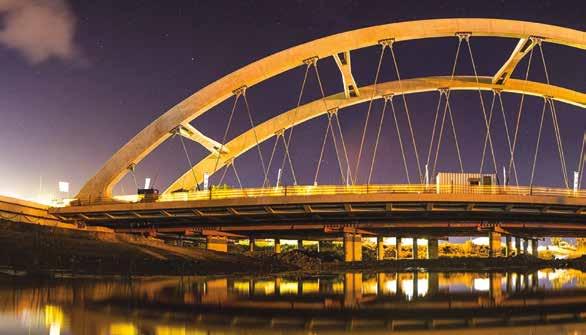
The 22-metre bridge won the 2022 Fulton Award in the Infrastructure Greater Than R100-million Project Value category and received a commendation in the Innovation and Invention in Concrete category.

AECOM SA was the project manager and structural designer, the client was the Western Cape Department of Transport and Public Works, and the main contractor was Haw & Inglis Civil Engineering. Over the five-year duration of the project, 42% of the contract value was allocated to opportunities for locals.
The Western Cape Ministry of Finance and Economic Opportunities announced in early 2022 a focus on the construction and maintenance of roads and education, health and general building facilities. This is based on the belief that infrastructure investment is one of the most significant contributors to provincial economic growth.
An additional R2.6-billion was pledged to infrastructure, as part of a R30.3-billion medium-term package. Spending on infrastructure assets is intended to increase by 6.1% every year, and by 54.2% on new infrastructure assets.
A new Department of Infrastructure will be created through the merger of the Human Settlements Department with the parts of the Transport and Public Works Department which deal with property and
roads. A Department of Mobility will also be established to work on coordinating transport systems and trying to revive the passenger rail network, among other things.
In his 2022 State of the Province Address, Premier Alan Winde claimed that Cape Town is:
• Africa’s greentech hub
• Africa’s BPO capital
• Africa’s tech capital
In addition, he quoted the Global Startup Ecosystem Report 2021, where Cape Town is listed as the number one performer in Africa for technology ecosystems and is home to almost two-thirds of all start-ups in South Africa.
There are 22 active incubators and accelerators in the region which provide networking and marketing opportunities and links to funders and markets.
Information and communications infrastructure is no less important than physical bridges and it is because the Western Cape has been investing in digital infrastructure that the Premier can persuasively make these claims.
The provincial government’s broadband roll-out project is in Phase 2 and all 1 910 sites are expected to be upgraded to a minimum of 100/Mbps in 2022 with Phase 3 taking minimum speeds to 1Gbps.
The Western Cape Department of Health was the first in the country to go digital, including 265 primary healthcare centres and 181 mobile posts.
The Premier will be pleased to know that Youth Media Movement hosted a first SA Drone Soccer Day in Mitchell’s Plain in 2022 to encourage young people to take up and apply technology.
As a way for the Western Cape to show off its growing reputation as a tech-friendly destination, the launch of the Cape Town Stock Exchange in August 2021 was an ideal event. When several new bourses launched in 2017 most of them put an X in their names and all of them based themselves in Johannesburg. In 2021, 4AX made the move south and rebranded as the Cape Town Stock Exchange.
Cape Town also, according to the Global Financial Centres Index (GFCI), ranked second in Africa in 2020 (behind Mauritius) in competitiveness as a financial centre. Neighbouring Stellenbosch is advancing its reputation for technological innovation and the output of the region’s four universities and six TVET colleges ensures that the tech sector has the necessary human capital.
Cape Town’s share of national employment in the financial sector is about 20% and the contribution to gross value-added (GVA) is 15%.
Credit: AECOMAir Belgium has added Cape Town to its destination list. In the first six months of 2022, 8 300 passengers and 500 tons of air cargo were flown between the two destinations. A direct flight will follow as passenger and cargo volumes grow. Credit: Air Belgium
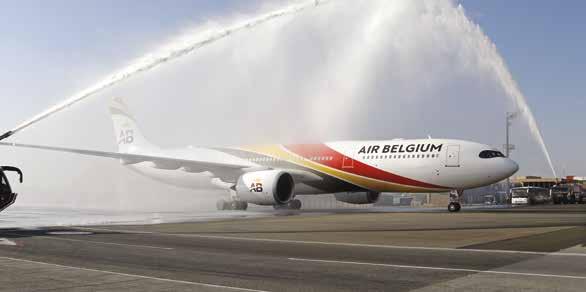
The province has a dedicated investment agency, Wesgro, which also works to promote the region’s tourism. The Investment Promotion Unit of Wesgro is working with various regions within the Western Cape to attract investment and accelerate exports.
In recent years, the biggest investments have been in renewable energy and manufacturing. Other important sectors are agro-processing, aviation, business services, education and training, financial services, real estate, ICT, light manufacturing, oil and gas, timber, tourism, waste beneficiation and clean energy.
Another vehicle for attracting investment are Special Economic Zones (SEZ) and Industrial Development Zones (IDZ). Zones at Atlantis and Saldanha aim to tap into growing markets – maritime, oil and gas and renewable technologies. Large industrial operations already exist at Saldanha and the Port of Saldanha Bay is the portal for the export of South Africa’s iron ore. The Saldanha Bay Industrial Development Zone (SBIDZ) is becoming a hub for a range of maritime repair activities and oil rig maintenance and repair.
The Atlantis Special Economic Zone (ASEZ) is attracting investors in the greentech market. An early investor in the zone was GRI Towers South Africa, a wind turbine tower manufacturer. With new renewable energy projects such as solar parks and wind farms being rolled out every month, this sector is on a steep growth path.
Finance, business services and real estate combined contribute 28% to the gross domestic product (GDP) of the Western Cape. The financial services and insurance sector are key components of the economy.
Although agriculture accounts for just 4.3% of GDP on its own, the sector is responsible for the fruit and vegetables that contribute to agroprocessing which accounts for nearly 40% of the province’s export basket. (Agro-processing accounts for 8.1% of GDP.) Citrus, wine, apples and pears, grapes, fruit juice, fruit and nuts and tobacco all appear in the top 10 of the province’s exports. Seventy percent of South Africa’s beverage exports come from the Western Cape. Grapes and wine sales to Europe remain strong, but the Chinese market is becoming increasingly important.
The province has a diverse manufacturing sector ranging from textiles, clothing, footwear, boatbuilding and furniture to coke and refined petroleum products. Excluding agro-processing, other manufacturing makes up 6.9% of GDP.
A R2-billion facility is under construction by the Biovac Institute in response to securing contracts with Pfizer and BioNTech to produce vaccines for distribution in Africa. Biovac is a private company in which the state has a 47.5% stake. ■
The Shaping Futures Foundation undertakes to address the challenge of tertiary education funding in South Africa:
• match corporate skills development contributions to deserving students
• ensure this spend is allocated efficiently and in accordance with the country’s demographic profile
• assist companies to maximise their BEE obligations
• liaise with tertiary institutions.
• Corporate donors can play a meaningful part in improving the lives of all South Africans.
• Donations to the Shaping Futures Foundation qualify as skills development expenditure.
• Any spend that the corporate has already incurred is taken into account.
• An 18(A) certificate can ensure tax efficiency.
• Supporting a graduate could lead to hiring opportunities for the donor companies which will further enhance their demographic profile and improve their employment equity score.
The Shaping Futures Foundation is a non-profit organisation that has been matching donors with students with ability but limited funds since 2017.

Despite having the academic ability to pass, many students can’t afford the fees and so they are denied graduation. Many of these students are the first in their families to attend universities. With government battling to narrow this funding shortfall, it is a national imperative for these students to graduate and join the workforce. Corporates can assist in narrowing this divide and at the same time gain recognition on their BEE scorecard. The ability for the graduating student to find meaningful employment improves not just their life but potentially those of their family as well.
LEARN MORE AT: www.shapingfutures.org.za
SEND AN EMAIL TO: chloe@shapingfutures.org.za

Revised BEE Codes focus heavily on the human resource elements within the scorecard and have made skills development a priority element.
As a priority element, large companies that fail to achieve at least 40% of the skills development points on offer will automatically be downgraded a level. Qualifying small enterprises (QSE) will also benefit by contributing to skills development.
• Individual South African students
• South African families
• Your company.
The Shaping Futures Foundation also currently administers a school feeding scheme providing daily meals to 2 800 underprivileged learners.
Corporate South Africa has a chance to put a deserving student in a lecture hall at a tertiary institution.Mireille Wenger, Minister of Finance and Economic Opportunities, explains how the Western Cape Provincial Government intends to achieve maximum impact while prioritising jobs, safety and wellbeing.

You described your Medium-Term Budget Policy Statement (MTBPS) as a “framework of hope”. Please expand. We face significant challenges as a nation, including sluggish economic growth, high levels of unemployment and poverty, significant debt-service costs, a rising cost-of-living and a debilitating energy crisis.
In the face of these challenges, there are promising opportunities that present a clear pathway from recovery to growth in the Western Cape. Guided by our “north star” priorities of jobs, safety and wellbeing, and underpinned by our budget principles of protecting our core mandates, focussing on programmes that maximise impact, doing more with less to deliver value for money projects, while acting to protect the long-term fiscal sustainability of the province, the MediumTerm Budget Policy Statement and Adjustment Budget set out a “framework for hope” by detailing the funding allocations that will deliver hope to the citizens of the Western Cape by setting us on a course towards a better, more prosperous future.
Mireille has a Master of Arts in International Relations from the University of Stellenbosch and a Master of Philosophy in Criminology, Law and Society from UCT. She has also completed the Programme in Political Science and Sociology at Sciences Po in France. She has served as the Chief Whip in the Western Cape Provincial Parliament, chaired the Ad Hoc Committee on Covid-19 and the Parliamentary Oversight Committee and also previously served as the Chairperson for the Community Safety Committee.
In all that we do, we are guided by our priorities of jobs, safety and wellbeing, which we believe are vital components for real change and our reason to hope. Which is why over the term of the 2022/23 Adjustment Budget, to keep us on course from recovery to growth, and to give full effect to our framework for hope, we will have allocated:
• R54.75-billion to our wellbeing priority
• R15.87-billion to our growth for jobs priority
• R2.65-billion to our safety priority.
Over the longer term, it remains critical that we unlock much higher levels of economic growth in the Western Cape, so that we can create opportunity.
We are currently formulating a new Growth for Jobs Strategy for the province.
At the core of this strategy is the understanding that the private sector drives economic growth and job creation and the government’s job is to enable this, firstly by providing the foundations for growth, such as infrastructure, energy
and water, by unlocking housing opportunities and building reliable, safe roadways, as well as delivering skills for the economy. Secondly, government must create an enabling environment for entrepreneurs, businesspeople and citizens and make it easier for businesses, big and small, to trade in the Western Cape.
What is the provincial government doing about the risk posed by Eskom?
The Western Cape has made it a strategic priority to become energy resilient and to be the first province to beat loadshedding. Premier Alan Winde’s cabinet-level Energy Council brings together government, citizens, businesses and civil society to coordinate immediate action.
This coordination, with interventions over the short term, will be key, while we continue to lay the foundations, over the medium term, for an energy-resilient future through our Municipal Energy Resilience (MER) Initiative.
This programme is making important strides in unlocking energy opportunities by enabling municipalities, businesses and households to generate, procure and sell power. To enable the private sector, we are mapping out large private-sector energy users’ current energy useand-demand growth projections as well as their alternative-energy-supply interventions and plans. The intention is to map this information against municipal grid capacity to enable the fast-tracking of private-sector implementation of small-scale embedded generation and electricity-wheeling solutions where possible.
To support municipal readiness, the Western Cape Government has provided funding to 10 municipalities for 16 foundational energy studies including the development and updating of electricity master plans and cost-of-supply studies. We are in the process of having standardised legal agreements drafted for the use of municipal grids in wheeling transactions.
Our goal is to generate an additional 500MW of power for the Western Cape by 2025, and we are constantly looking at ways to focus, innovate and scale up so that we move towards our goal as fast as possible.
What was behind the somewhat improved statistics for unemployment in Q3?
It was welcome news that, according to the Quarterly Labour Force Survey, just over 85 000 jobs were created in the Western Cape in Quarter 3, and that over 203 000 jobs were created in the Western Cape year-on-year. While the Western Cape’s expanded unemployment rate also decreased by 1.8 percentage points quarter-onquarter and by 0.8 percentage points year-onyear, the fact is that we need to achieve much higher and sustained economic growth if we want to employment to increase.
Has progress been made in terms of the functioning of the Port of Cape Town?

Ensuring that the Port of Cape Town (PCT) reaches its full potential is a priority for the Western Cape Government because we believe that logistics, mobility and export facilitation are critical pieces of the puzzle of break-out economic growth that gets us on new trajectory of prosperity and hope.
According to a high-growth scenario contained in a research report by Impact Economix, an efficient PCT with sufficient capacity and investment in key infrastructure has the potential to contribute an additional R6-billion in exports, roughly 20 000 direct and indirect jobs, over R1.6-billion in additional taxes by 2026, and an additional 0.7% contribution to the Western Cape Gross Domestic Product.
To achieve this high-growth scenario, the Western Cape Government is committed to working together with all levels of government and the private sector to unlock the port’s full potential. We believe that enabling private sector participation at the Port of Cape Town, as is currently the case for Durban and Ngqura, will be key to this. ■
With SA’s energy crisis showing no sign of slowing down, the need to accelerate green investments is now more urgent than ever.
By Wesgro CEO Wrenelle Stander
While South Africa is considered the best area for investment in Africa by investors from various countries around the world – topping the list of foreign direct investment with 31 projects in 2020 according to the Attractiveness Report Africa by global professional services firm Ernst & Young (EY) – the country hasn’t done enough to build on this advantage and scale up renewable energy investments.
So, what should South Africa be doing to establish itself as a green investment hub?
Understandably, many bemoan loadshedding as it continues to be a massive drag on productivity and output in key sectors of the economy. But there is a silver lining; loadshedding presents the most opportune moment for South Africa to speed up the transition to renewables and decarbonise by creating an environment conducive for green investments.
With its abundant sun and wind, South Africa has the basic resources to attract investments in that space. But we should be doing more to lure green investors.
Ramping up targeted incentives to companies operating in the renewable energy space could be one of the most effective ways to spur green investments into the country, and thus keep the lights on – which is necessary to fire up the economy and to make a meaningful dent in unemployment, poverty and inequality.
Huge tax benefits, which could effectively address green economy challenges and changes in consumer behaviour, are one of the most important factors influencing green investment decisions today. This can be seen in countries that top EY’s investment attractiveness index, including the US, the UK and Germany. Examples of sustainable activities that receive substantial tax credits in those countries are in energy-efficient renovations especially in residential buildings. There are also credits for companies that invest in solar panels, wind and solar energy equipment. Companies that send waste from landfills for recycling or reuse also qualify for tax benefits.
A recent study conducted by global research firm Kantar on behalf of Wesgro, the official tourism, trade and investment promotion agency for Cape Town and the Western Cape, shows that there is a growing appetite to invest in the green economy globally and many governments are putting in place clear and targeted measures to make it easier and more incentivised for players in that market.
The US, for example, recently promulgated the Inflation Reduction Act of 2022 which includes almost $400-billion in clean energy and climaterelated spending. The law partly puts an emphasis

on subsidies and tax credits to stimulate investment in clean-energy technologies rather than on a carbon price or penalties. In broad terms, it aims to ramp up investments in domestic manufacturing capacity, encourage domestic procurement and the diversification of supply chains, and incentivise research and development and commercialisation of clean technologies like carbon capture, storage and clean hydrogen.
A major portion of the funding under the new law is directed towards clean energy through a mix of tax incentives, grants and loan guarantees, with the ultimate goal of drastically lowering US carbon emissions. The largest amount of funding will support clean energy and transmission, followed by clean transportation, including a switch to electric vehicles (EVs).
Similarly, the UK provides generous tax breaks for companies that operate in a sustainable manner. A Climate Change Levy (CCL) is paid by businesses in key sectors, including industrial, commercial and agricultural or public services for electricity, gas and solid fuels.
But if the firm uses small amounts of energy (for example, when energy is not used as fuel), or uses domestic energy, it doesn’t need to pay the main rate of CCL on certain supplies. A company can also claim “enhanced capital allowances” when buying energy-efficient, low or zero-emission technologies, such as electric vehicles or zero-emission trucks. This reduces the amount of tax to pay. A company can also obtain tax breaks if it sends waste from landfills to be recycled, incinerated or reused.
Meanwhile, in 2019 a law on climate protection was introduced in Germany. The law includes, among other measures, tax incentives for energy-efficient renovation measures in residential buildings or a mobility bonus for people who commute to work. The “European Green Deal” – with the aim of achieving climate-neutral business activity by 2050 – also gives the tax policy a decisive role in the transition to greener and more sustainable growth.
By 2030 Germany plans to produce at least 65% of all its electricity from renewable sources, and all electricity generated in the country should be greenhouse-gas neutral before 2050.
To secure the green transition, the German government plans to invest €1.5-billion in green hydrogen to help decarbonise the economy. Such measures send a clear message to investors that renewables will be supported and builds confidence.
Meticulously prepared top-down plans of a country on sustainable development give potential investors a defined road map and show investment opportunities in a clear way.
In South Africa, incentives to fast-track the transition to a green economy have hardly moved the needle, amid lack of clarity on key government policies. The political will is there, for the most part. What is needed is urgent and decisive action.
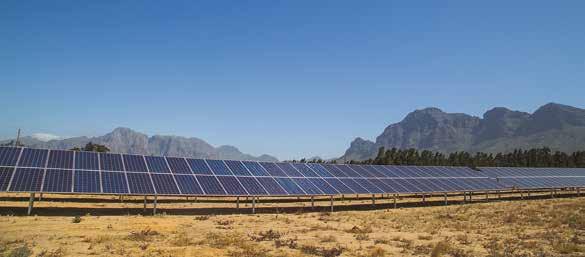
The energy crisis will not be fixed by any one stakeholder and the collaboration of the public and private sectors will be the catalyst for getting this
right. The Western Cape is taking the lead on that front with Premier Alan Winde recently stating that the province is looking into ways in which private businesses can be provided with the necessary support to ramp up more investment into alternatives. The province has always emphasised the importance of intensifying and expanding the green energy drive by boosting relations with local and international partners.
South Africa has the potential to attract more green investments by implementing policies and initiatives that promote the use of clean energy and sustainable development. This could include setting clear renewable energy targets, providing lucrative financial incentives for clean energy development and creating a predictable regulatory environment.
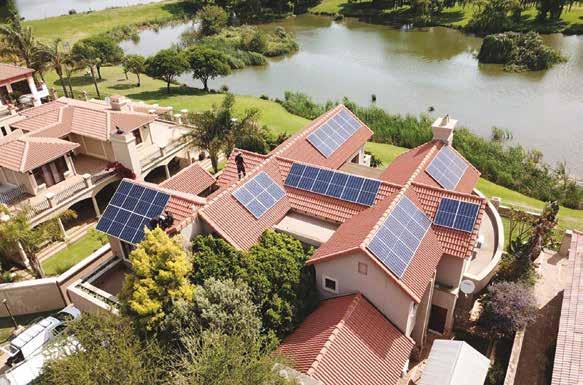
By implementing policies and initiatives that promote clean energy and sustainable development, South Africa can accelerate the massive rollout of renewable energy, crucial to end the crippling loadshedding crisis. But this will require a comprehensive and coordinated approach that involves the government, private sector
and civil society. Only then can SA build a much more attractive environment for green investors, accelerate the drive to a low-carbon economy, and end loadshedding which has become the biggest handbrake on the economy. ■
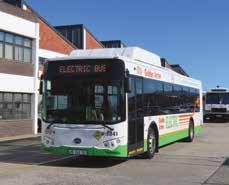
The Western Cape Business Opportunities Forum (WECBOF) provides a platform for businesses to establish and maintain contact with fellow entrepreneurs; to have access to opportunities, information and training; and to have representation on a number of relevant forums of government and other associations focussed on growing and enhancing the commercial sector, with a specific focus on small-, medium-, and micro enterprises (SMMEs).
WECBOF is widely recognised and respected as a powerful voice for business in the Western Cape; we are a provincial service organisation with our focus and attention firmly on the national and international business pulse.


CALL US TODAY.

Gas, green hydrogen, renewable energy and electrical vehicle component manufacturing are all in the mix as Atlantis SEZ and Saldanha IDZ gear up to attract investors
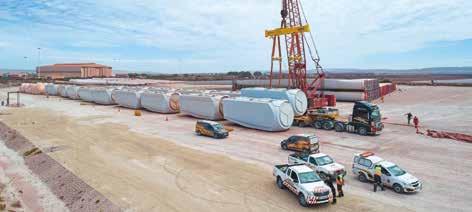
Both of the Western Cape’s Special Economic Zones (SEZs) have a role to play in the changes that are coming in the field of energy.
The Atlantis Special Economic Zone and the Saldanha Bay Industrial Development Zone each has its own focus but both are based on attracting the private sector to invest by creating well-serviced land with good infrastructure. Both projects form a vital part of the Western Cape Government Economic Recovery Plan.
The Saldanha Bay IDZ helped create 2 000 jobs in the 2021/22 financial year. The IDZ is based on the existing industrial and port activities of Saldanha and the Port of Saldanha Bay, which is the main portal for the export of South Africa’s iron ore. The Saldanha Bay Industrial Development Zone (SBIDZ) is becoming a hub for a range of maritime repair activities and oil rig maintenance and repair.
The Western Cape has been lobbying hard for Saldanha Bay to be a site for a gas-to-power plant for some years. If a gas plant were to be built at Saldanha, then it could be a catalyst for the use of gas in many other sectors such as manufacturing and residential.
However, it could be that another energy source is going to take the place of gas for the SBIDZ. Experts have reported that the Saldanha Bay region has excellent solar and wind resources which could produce large amounts of renewable energy electricity at competitive costs.
Two industrial giants agreed in 2022 to cooperate to find ways to produce sustainable chemicals and fuels, together with “green steel”. A key element for both Sasol and ArcelorMittal SA will the production of so-called “green hydrogen”, namely hydrogen generated via renewable energy sources.
The cooperation of Sasol and ArcelorMittal SA could have massive implications for the Saldanha
region, with Sasol following up its agreement with the steel manufacturing with the signing, in the same week in October, of a Memorandum of Understanding with the SBIDZ to work together to establish a green hydrogen hub.
The National Department of Trade, Industry and Competition (dtic) and the provincial government have collectively invested R500-million in core infrastructure, a lease agreement has been signed with Transnet National Ports Authority (TNPA), and a phased approach to development has begun.
The concept of the SBIDZ works well within two broader projects: Operation Phakisa and Project Khulisa, the targeted growth strategy of the Western Cape Provincial Government which includes servicing and repairing of oil rigs as a priority.
The scheduling of the Atlantis Special Economic Zone (SEZ) State Owned Company (SOC) Limited as a provincial business enterprise was approved by National Treasury on 15 December 2021.
The ASEZCo is driving sustainable development and job creation by harnessing the opportunities in the growing green economy. The ASEZ Greentech theme aims to attract manufacturers wanting to supply their technologies to independent power producers bidding on the national renewable energy programme, the Renewable Energy Independent Power Producer Procurement Programme (REIPPPP).
One of the first investors in the ASEZ was GRI Towers South Africa, a manufacturer of windturbine towers, a perfect fit for the intention to promote renewable energy and green technology manufacturing sectors.
By early 2022, the zone had attracted more than R790-million in investment, with two investors expanding in the previous 12 months, creating over 400 jobs in the process. Treasury’s approval should spark more activity and the SEZ plans to add an additional three investors in the 2022/23 financial year.
As global demand for electric vehicles increases, so South African manufacturers will start having to import or make compatible components. The ASEZ is positioning itself to be the preferred site for electrical vehicle component manufacturing.
Another element that is being encouraged at ASEZ is resource-efficient cleaner production. The zone subscribes to UNIDO’s Eco-Industrial Park (EIP) principles and four green utility infrastructure goals underpin the management plan: reducing carbon emissions while providing energy security; longterm water security and efficient water use; reduce waste to landfill; working with nature through an indigenous landscaping plan.
The province and the City of Cape Town are lobbying national government for a greater role for municipalities in the generation and distribution of energy. The potential of renewable energy is being realised through the national independent power producer programme.
A market intelligence report covering energy, renewable energy, water and waste was created by GreenCape to map the assets and challenges in these areas.
In addition to trying to attract green investment into the province, the province is working for improved regulations related to small-scale embedded generation (SSEG). Cape Town also wants to be able to rent out its infrastructure to a power producer who can supply a user via that infrastructure.
Much of this work is done by a unit called the Sustainability Energy Markets within the Energy Directorate. Another area of focus for this group is to investigate energy use by low-income households.
The Cape Peninsula University of Technology’s Energy Institute is a leader in research in the field of electricity. The South African Renewable Technology Centre (SARETEC) on the Bellville campus of CPUT offers courses such as Wind Turbine Service Technician and Solar Photovoltaic Service Technician and various short courses such as Bolting Joint Technology.
The Centre for Renewable and Sustainable Energy Studies is at the University of Stellenbosch where a new School for Climate Studies has been launched. The University of Cape Town has the Energy Research Centre and the University of the Western Cape is doing research on the possibilities of hydrogen as an energy source. ■
Thomas Roos, Principal Research Engineer at the Council for Scientific and Industrial Research (CSIR), reports on cooperation with three German ministries.
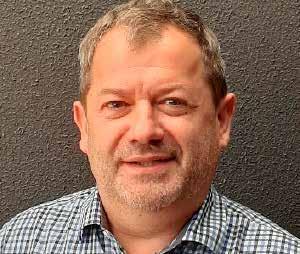
It may therefore legitimately be asked: “What is green hydrogen, and why is it important?” While the term green hydrogen is often used to describe hydrogen produced from any non-fossil-fuel-based source (such as biogenic or nuclear), in this context it is more strictly defined as hydrogen produced by splitting water by electrolysis into hydrogen and oxygen, using electricity from renewable sources. Green hydrogen may therefore be regarded as renewable electricity stored in chemical form.
Under the Just Energy Transition Partnership announced at COP26 in Glasgow, the governments of UK, France, Germany, the USA and the EU have agreed to provide $8.5-billion in financing in the form of grants and soft loans, to assist South Africa to decarbonise the electricity sector by early retirement of coal-fired power plants and expansion of renewables, to accelerate the introduction of electric vehicles and to facilitate the adoption of green hydrogen. In February, the Department of Science and Innovation released the Hydrogen Society Roadmap. In November at the South African Green Hydrogen Summit, President Ramaphosa announced that the Just Energy Transition Investment Plan, recently released for public comment, has identified green hydrogen as one of the four “big frontiers” of a just energy transition, indicating that it has huge growth and investment potential.
CSIR research is showing ways that South Africa can become a significant exporter of green hydrogen and the body is already involved in projects with several German ministries.
Green hydrogen is important for the decarbonisation required by the Paris Agreement (signed and ratified by 193 countries) and the European Green Deal (which commits the EU to be carbon-free by 2050). The most efficient and generally lowest-cost decarbonisation approach is to convert current fossil-driven processes to instead be directly driven by renewable electricity. There are two scenarios, however, where this direct renewable electrification is not always possible or feasible.
The first scenario involves geographic locations where energy demand exceeds feasible renewableelectricity supply. This is the case for Japan, the world’s third-largest economy and a signatory to both the Kyoto Protocol and the Paris Agreement. It is also in the top four importers globally of the three major chemical energy vectors (coal, oil and natural gas). Its decarbonisation options are constrained: it has very limited natural energy resources and the Fukushima disaster significantly dampened public appetite for nuclear power. As a result, Japan plans to move its economy towards hydrogen – mobility by fuel cell electric vehicles, homes powered by fuel cells (with the waste heat produced providing domestic water heating) and central power generation from combined-cycle power stations,
fired by green ammonia. To allow this, from 2030 Japan will import about 300 000 tons of hydrogen per year (at a target price of $3 per kilogram), rising to between five-million and 10-million tons of hydrogen per year by 2050.
This presents an opportunity for South Africa: CSIR modelling has shown that the combination of South Africa’s excellent solar and wind resources and the expected cost reductions over time in solar PV, wind and electrolyser equipment allow green ammonia produced in South Africa to be delivered to Japan in 2030, meeting the Japanese cost target.
The second scenario involves two broad categories of hard-to-abate economic sectors. The first category is heavy-duty, long-range transport where the use of batteries is ruled out by range, power density or charging time limitations, such as commercial aviation, maritime shipping and long-distance trucking.
The second category is a subset of carbonintensive industrial processes, such as iron and steelmaking, cement manufacture, ammonia production and the manufacture of plastics. Green hydrogen, together with its derivatives such as green ammonia, green methanol and sustainable aviation fuel, provides a pathway to decarbonise these sectors.
For Germany to meet its decarbonisation targets, the National Hydrogen Strategy of the German Government states that between 2.7-million and 3.3-million tons per year (90-110
TWh/year) of green hydrogen will be required by 2030, but that only a maximum of 420 000 tons per year (14 TWh/year) can be generated in-country (14% of this amount). By far the bulk of the green hydrogen will have to be imported, some from elsewhere in the EU such as Portugal, Spain and the Ukraine; and the remainder from renewablerich countries in a development relationship with Germany, such as South Africa.
Three separate German federal ministries are funding projects to develop the green hydrogen economy in South Africa: BMWK (Ministry for Economic Affairs and Climate Action), BMZ (Economic Cooperation and Development) and BMBF (Research and Education), and CSIR is involved in each of these. In a project funded by BMWK, CSIR and Meridian Economics were contracted by KfW Development Bank to solicit, evaluate and rank applications from hydrogen developers for 200-million euros in concessional financing to fund green hydrogen projects in South Africa. From 55 initial applications, a longlist of 20 projects passed the initial filtration process, leading to a shortlist of between seven and 12 projects, depending on the breakdown of grant versus concessional-loan financing. The oversubscription of the funding shows significant market appetite.
CSIR is well positioned to support the energy transition in this way, as the development and implementation of green hydrogen will draw on many of CSIR’s capabilities. ■

The Cape Chamber of Commerce and Industry is working with members to promote growth and build a smarter economy.

The Cape Chamber of Commerce and Industry, Africa’s oldest member-based business chamber, was established in 1804, firmly cementing our place as a catalyst for economic growth for over two centuries. We pride ourselves on being an instrumental player in establishing our region as one of sub-Saharan Africa’s major centres of trade, industry and innovation – a legacy that continues to this day.
As a dynamic organisation in a fast-changing world, our focus is on remaining relevant to the current challenges affecting business. Our key mandate is to improve the overall business environment, promoting growth and sustainability, and supporting our members’ interests. Our strategic interventions include lobbying key government departments and institutions, creating public-private dialogue through task teams and spearheading discussion forums to address system blockages. Through dialogue we strive to facilitate consensus around critical issues, and through targeted action we effect meaningful change. Strengthening public-private dialogue in turn strengthens business competitiveness and steers us towards a smarter network economy.
We mobilise all economic stakeholders –private sector, business organisations, local government and national government – to collectively address sector-specific, industryidentified constraints and bottlenecks. This entails setting up task teams to identify needs
and effect legislative and regulatory change on key issues, a process galvanised by the post-pandemic economic milieu. Encouraging businesses to join hands with us and strengthen the dialogue through collective action makes all stakeholders more globally competitive.
In line with our collaborative approach, and as part of our service offering, we provide a digital platform where members interact and share skills and services. Our website forums and data portals function as a much-needed digital library and notice board aimed at keeping our members informed. Skills development, enterprise development, knowledge-sharing and partnership through topical webinars, seminars, workshops and business networking events form part of our offerings.
The Chamber’s professional team assists with a wide range of business enquiries, from local issues to international trade and investment. Our advice and information is current, timeous and relevant. Information is sourced on a continuous basis from a broad network of local and international partners. Our International Trade desk is the first point of contact for international business and we arrange opportunities for collaboration and networking, giving our members visibility and access to global markets. Together we can actively shape our future success.
capechamber.co.za
Image: Shawn Harrison on UnsplashWe are immensely proud of our 218 year history as the voice of organised business in the Western Cape. The Cape Chamber of Commerce and Industry continues to have relevance to the needs of business today - with a finger on the pulse and our eyes firmly to the future, we are a driving force of change and progress towards sustainable economic development.
We facilitate connection in exports, targeted imports and investments, unlocking new opportunities for our members, locally and internationally. Through our vast network of dynamic partnerships, we give our members, both large and small, visibility and traction.
In achieving our aim of growing the Western Cape economy sustainably, we know that creating an enabling environment for business to thrive is the key to economic prosperity.

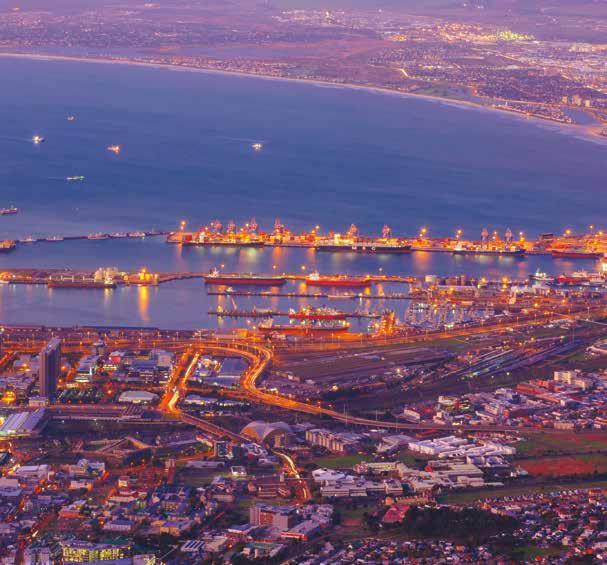
We have a targeted focus on:
• enterprise development and capacity building









• clustering and sectoral development
• precinct development and geographic spread

• competitiveness and value chains
• advocacy to advance the needs of our members
We have initiated partnerships with like-minded organisations, spearheaded public-private dialogue processes, and identified pain points in the enabling environment. We are mobilising all stakeholders on behalf of our members to steer the Western Cape towards a smarter network economy.
Join us to shape a better future.
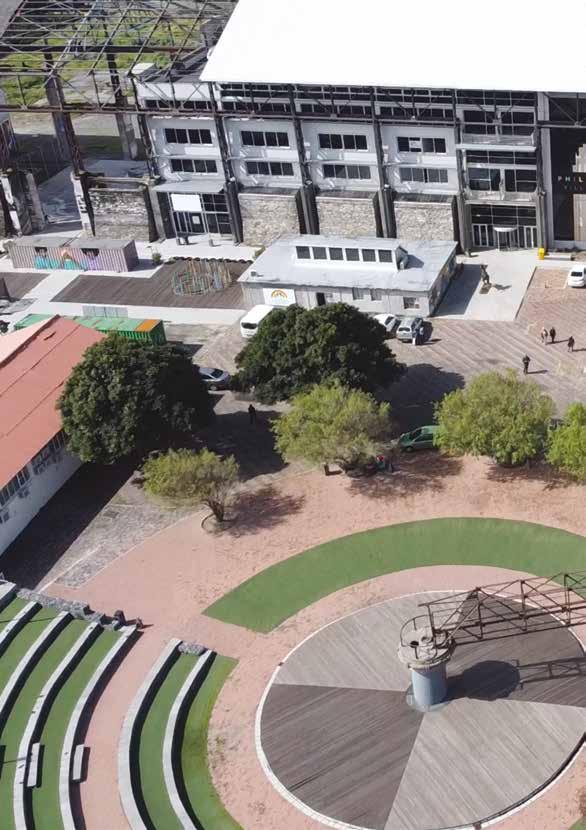
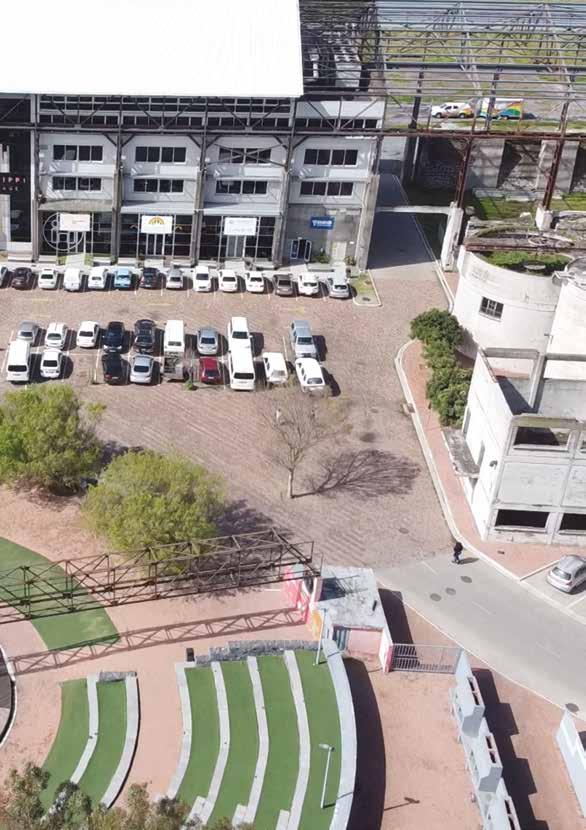
Farmers are trying to save a canning factory.
Tiger Brands announced in 2020 that it intended focussing on what it called “everyday branded food and beverages”. The result of that focus is that the company’s food-canning business is to be put up for sale.
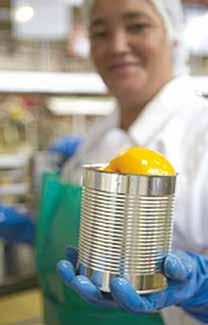
Fears were raised in the town of Ashton that up to 4 000 jobs would be lost and 300 farmers in the district would be wiped out if Langeberg & Ashton Foods canning facility were to close. Ashton is in the Langeberg Local Municipality within the Cape Winelands District Municipality. The company is a subsidiary of Tiger Brands, the country’s biggest producer of food.
A local consortium of 160 fruit farmers was considering trying to buy the facility. Agri SA estimated they would need an amount approaching R300-million. This was proving difficult to raise but in July 2022, Tiger said it would keep the operation going for one more season.
Suiderland Plase managed to build and start operating a new citrus packhouse despite the disruptions of Covid-19 and tough market conditions. Named Bergpak, the packhouse, pictured, is designed to pack 120 000 bins of fruit per year from year three, and the volume could grow as high as 280 000 bins in a season.
The facility is in the vicinity of Piketberg and is the company’s third packhouse. It will house a variety of citrus cultivars which will run on two six-lane sorters. At Wespak, near Clanwilliam, and Suiderpak (Swellendam), the packhouses deal with 70 000 and 60 000 bins respectively.
The company grows, packs and markets fruit and recently has been expanding its plantings in soft citrus, lemons and table grapes. A fairly new growth area in agriculture is the production of liquid kelp products. Farmed kelp in Gansbaai is processed to create products that assist with root growth in crops. Afrikelp is a company that exports to more than 50 countries and claims that its products improve water and nutrient-use efficiency, together with equipping plants to better handle droughts.
The South African Rooibos Council announced in 2022 that it would start paying a levy on the product to trusts for Khoi and San people. A payment of R12.2-million was paid in July and the future levy would amount to 1.5% of the farm gate price.
This followed news that the long battle for protected status for rooibos in the EU finally reached an end. The best-known products that are forever linked to their home regions are champagne and
port, and France and Portugal have fought hard for those rights. Now the Western Cape’s herbal tea product enjoys the same privileges, which is great news for the roughly 450 farmers working with rooibos (350 commercial plus 100 small-scale farmers). The sector produces about 20 000 tons of rooibos every year, about half of which is exported.
Agribusiness and agro-processing are vital parts of the provincial economy with about 45% of South Africa’s agricultural exports moving through the province. The value-add in the sector amounts to more than R14-billion per annum (Invest Cape Town).
Seven of the top 10 exports from the province are agricultural or agro-processed products. As Wesgro notes, the Western Cape is responsible for
• Almost half of South Africa’s agribusiness exports
• About 70% of South Africa’s beverages exports
• About 85% of South Africa’s fisheries exports
Agricultural products as a sector leads regional exports, second only to the petroleum sector.
In addition, the region exports 70% of all South African beverages and spirits and 96% of its wine. The region produces 11 different commodities. Fruit, poultry, eggs, winter grains, viticulture and vegetables comprise more than 75% of total output.
Exporters were introduced to some digital innovation in 2020 in the form of the Cape Export Network. CEN, a joint initiative of the Western
Aquaculture Association of Southern Africa: www.aasa-aqua.co.za
Citrus Growers’ Association: www.cga.co.za
Fresh Produce Exporters Forum: www.fpef.co.za
South African Rooibos Council: www.sarooibos.co.za
Western Cape Department of Agriculture: www.elsenburg.com
Cape Provincial Government, Wesgro and Wines of South Africa (WoSA), is a platform that connects wine producers, buyers and importers.
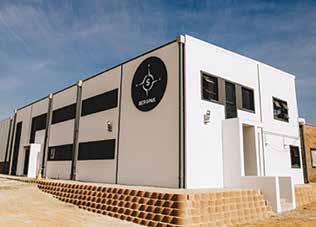
Assessed independently from the country, the Western Cape is the world’s fifth-largest exporter of citrus fruits. Oranges are the province’s number one citrus export and soft citrus is growing. Europe remains the most important market but the Asia and Oceana markets are growing. The top five countries are the Netherlands, UK, Russia, UAE and China.
Berries are a growing subsector and two-thirds of production occurs in the Western Cape. More than 70% of the crop is exported and the major production companies are Berryworld South Africa, United Exports and Haygrove SA. Berries thrive between George and Swellendam and sales of chippers have grown because blueberries have to be vigorously pruned. There is plenty of scope for exports to grow. Current annual exports are 13 500t compared to over 200 000t for table grapes and about 300 000t for apples (South African Berry Producers’ Association). Once producers pass muster with Chinese import authorities, volumes can be expected to grow. ■
Logistics are testing farmers’ ingenuity.
White wines fetched top prices at the 2022 Nedbank Cape Winemakers Guild Auction.
Both wine and grape production are supported by the Western Cape Department of Agriculture which offers technology, research and development, agricultural training and analytical services at plant pathology and water and soil laboratories.
Grape farmers, wine producers and exporters have had their hands full coping with a series of challenges that go beyond the normal worries about weather, unpredictable customer preferences, global competition and variable pricing.
Logjams at the Port of Cape Town create headaches for exporters of time-dependent fruit and just as Covid-19 restrictions were coming to an end, Russia invaded Ukraine, putting some of the income derived from exports in jeopardy.
Nearly 2% of South African wine is exported to Russia. In 2021 the volume increased to nearly seven-million litres. With payment normally made through SWIFT, Russia’s expulsion from that system made transactions impossible.
Despite these headwinds, the volumes of grapes inspected for export in the 2022/23 season were expected to decrease by only 8% in comparison to 2021/22 season figures. This estimate was released by the South African Table Grape Industry Association (SATI), headquartered in Paarl, South Africa, which estimated a crop total of approximately 71.7-million cartons (4.5kg equivalent).
SATI noted how farmers have focussed on crop-load management and quality to overcome logistical issues. Some regions are growing more white seedless grapes and producers are paying attention to the quality of grapes, both on-farm and during the cold-chain process.
Exports of South African grapes and wine to China are on an upward trend. The imposition in 2020 of prohibitive tariffs on Australian imports by China helped to boost that trend.
The wine and brandy industry has set about creating a new strategic framework in response to the various economic and geopolitical shocks. With wine tourism disappearing during Covid-19 lockdowns and input costs rising, the industry has chosen to strategise for a more sustainable future.
Led by Vinpro, the wine industry organisation which represents South African wine grape producers, wineries and wine-related businesses, a new strategic framework, the Wine Industry Strategic Exercise (WISE2025), and the Agricultural and the Agro-Processing Master Plan (AAMP) have been created.
For some time, South African winemakers have been aiming for better quality instead of
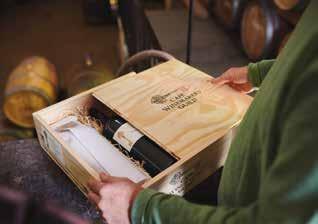
TABLE GRAPES OF OUTSTANDING QUALITY AND TASTE, WHICH ARE RESPONSIBLY GROWN IN SOUTH AFRICA TO MEET THE HIGHEST GLOBAL STANDARDS, START THE JOURNEY FROM THE FOOT OF TABLE MOUNTAIN TO REACH MARKETS AND TABLES AROUND THE WORLD.
Assisting producers to retain, grow and optimise markets is the most important function of the South African Table Grape Industry (SATI), an enabling grower association. SATI represents growers on key government and industry initiatives aimed at creating more opportunities from ownership to accessing new markets in a sustainable way.
SATI assists growers with industry information, transformation, research, technology and technical transfer, as well as training and education with the objective to establish South Africa as the Preferred Country of Origin for the world’s best tasting grapes.
THE NEXT TIME YOU HAVE GRAPES, MAKE SURE THEY COME FROM OUR TABLE!
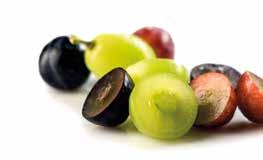
63 Main Road, Paarl | P.O Box 2932, Paarl 7620
+27 21 863 0366
info@satgi.co.za | satgi.co.za
linkedin.com/company/satgi @sati_sa

greater volumes. Which is not to say that volume is being ignored. Wesgro and WOSA (Wines of South Africa) are cooperating on expanding the Chinese market.
The SADC Economic Partnership Agreement gives produce from the region full or partial exemption from duties on exports into the EU. The three biggest markets by value and volume are the UK, Germany and the Netherlands.
There are over 3 500 wine producers in South Africa, with the large majority located in the Western Cape. Wine is produced by estates, independent cellars and producer cellars or co-operatives. The Distell group runs five distilleries and seven wineries in the Western Cape and produces about a third of the country’s natural and sparkling wine.
South Africa is the eighth-biggest wine producer globally and produces about 4% of the world’s wine.
Membership of the Cape Winemakers Guild (CWG) is by invitation and includes some of the best winemakers in the country. Members get together to taste wines from around the world and share their knowledge and ideas.
Cape Winemakers Guild: www.capewinemakersguild.com
SA Wine Industry Information & Systems: www.sawis.co.za
South African Table Grape Industry: www.satgi.co.za
Vinpro: www.vinpro.co.za
The Nedbank Cape Winemakers Guild Auction is one of the great events in the wine calendar. In 2022, two of the top four wines were white wines and both were produced by female winemakers –Samantha O’Keefe of Lismore Estate Vineyards and Andrea Mullineux (Mullineux & Leeu).
The Lismore Valkyrie Chardonnay 2021 from Greyton was knocked down for an average of R1 743 per bottle while the Mullineux Trifecta Chenin Blanc 2020 from the Swartland sold at R1 633.
The highest average price realised was R2 457 per bottle for the Kanonkop CWG Paul Sauer 2019. Auction prices were 30% higher than in 2021, as 30% of the lots were sold to international bidders. Strauss & Co auctioned 513 lots at a hammer price just shy of R14-million, resulting in an average bottle price of R1 227. ■
The South African Table Grape Industry (SATI) represents growers on key government and industry initiatives aimed at creating more opportunities in the sector, from ownership to accessing new markets in a sustainable way.
SATI assists growers with crucial industry information, transformation, statistics, research, technology and technical transfer as well as training and education with the aim of establishing South Africa as the Preferred Country of Origin for the world’s best-tasting grapes.
South Africa boasts five major table grapegrowing regions in South Africa. Their differences in soil and climate enable growers to supply the markets from November to May. The early season is dominated by varieties from the Northern Provinces and the valleys of the Orange and Olifants rivers.
This is followed by later-season varieties grown in the Berg River and Hex River Regions. Both of these regions are situated in the Western Cape, positioning the province as a large contributor to South Africa’s table grape industry.
The Berg River Region comprises 4 674 hectares of vines planted and is well-known for red seedless varieties. The region contributes to direct employment by supporting approximately 3 772 permanent and 19 521 seasonal jobs.

The Hex River Region, also well-known for red seedless varieties, comprises 6 394 hectares of vines planted. The region contributes to direct employment by supporting approximately 4 791 permanent and 13 885 seasonal jobs.
Collectively, the two regions exported a total of 44 409 320 4.5kg equivalent cartons of table grapes in the 2021/22 season.
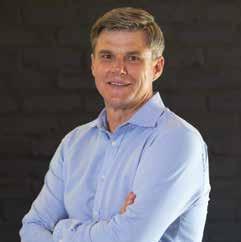
strategy and required a supportive policy environment to help stabilise the industry and place it on a sustainable footing.
Five areas have been identified to reach the new strategic goals for the wine industry. These include rebalancing the local market-pricing mix towards higher-value cultivars, capturing more growth at higher price points, growing higher-priced exports in key markets enabled by improved access, more than doubling wine tourism from the 2015 baseline by 2025, as well as accelerating black ownership.
The South African wine industry is a unique asset to the country. It is the eighth-largest wine producer in the world and lures thousands of local and international visitors to the Cape Winelands, generating significant revenue for the economy and helping to build and maintain a strong brand reputation for the country.
The South African wine and brandy industry contributes R55-billion to GDP and R17.9-billion to tax every year. The industry employs 269 096 workers with a total household income of R19.1-billion. It is the second-largest agri-exporter in the country to the value of R10.2-billion and wine tourism employs 12 878 employees, contributing R7.2-billion to GDP.
During the Covid-19 pandemic, the wine industry lost nearly a quarter of its sales due to the alcohol bans while tourism stopped. Rising input costs together with downward pressure on prices put further pressure on an already fragile industry.
This prompted the wine industry to establish a new strategic framework, the Wine Industry Strategic Exercise (WISE2025) and the Agricultural and Agro Processing Master Plan (AAMP). Recent shocks have set back the industry’s turnaround
WISE2025 has the vision to create a robust, adaptable and competitive wine and brandy industry. For this we must optimise our diverse resources to deliver sustainable value. Our new strategy has four very important strategic outcomes: a transformed and responsible value chain, a loyal and growing local market base, an established and enviable position in the global market and sustainability must be at the core of all we do.
Wine industry priorities included in the AAMP include market expansion, improving market access and trade facilitation, resolving policy ambiguities and creating an investmentfriendly climate. ■
Vinpro is a non-profit company which represents close to 2 600 South African wine producers, cellars and industry stakeholders. It keeps its members and the broader industry informed of industry trends and technical expertise and renders specialised services ranging from soil science to viticulture, agricultural economics and transformation and development.

Telephone: +27 21 276 0429
Email: info@vinpro.co.za
Website: www.vinpro.co.za
Astron Energy announced that it intended reopening its Cape Town refinery before the end of 2022, having closed the facility for repairs in 2020 after a fire.
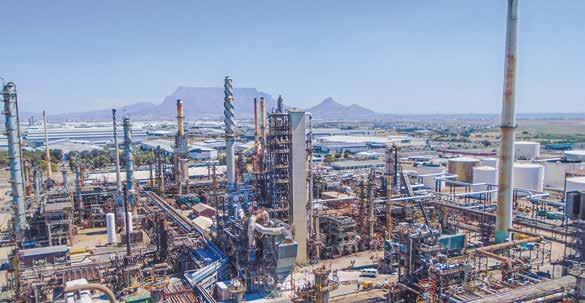
Astron’s statement had added significance in the context of the closure of Durban’s two refineries in 2020 and 2021, which left the Sasol/Total inland Sapref refinery as the country’s only functioning facility. When that refinery temporarily shut down in July 2022 because of delays in the supply of crude oil, more concern was raised about the country’s refining capacity.
Astron refinery had been producing about 100 000 barrels per day using feedstock from West Africa, a source which will be reinstated. Cape Town’s oil refinery was previously named Chevron, but with the $973-million purchase of Chevron’s downstream assets in South Africa by Off The Shelf Investments (OTS), it was rebranded as Astron. The Caltex service-station brand was retained. OTS is the Black Economic Empowerment (BEE) partner of mining giant Glencore, who financed the deal. The refinery in Milnerton produces petrol, diesel, jet fuel and liquefied gas for the Western Cape and for export to other African countries. The Western Cape spends R76- billion annually on crude oil imports and exports refined petroleum to the value of R13.2-billion.
Important public meetings relating to environmental concerns were set to take place in late 2022 and January 2023. Recent court cases relating to seismic activity off South Africa’s Wild Coast has shone the spotlight on the public participation process when it comes to offshore exploration for gas and oil.
WSP Group Africa has been appointed by the consortium which has discovered gas reserves off the coast of Mossel Bay to run the
environmental and social impact assessment (ESIA) for their proposed offshore production. Having notified Petroleum Agency South Africa of their intention to produce, TotalEnergies EP South Africa (TEEPSA), together with its joint venture partners, QatarEnergy, CNR International (South Africa) Limited and a South African consortium, MainStreet 1549, are obliged to run a public process, having successfully explored the area allocated to them off the south-east coast of South Africa.
The same companies and others are also applying for environmental authorisation to undertake exploration activities in Block 5/6/7 between Cape Town and Cape Agulhas, approximately 60km from the coast at its closest point and 170km at its furthest, in water depths between 700m and 3 200m.
Furthermore, potentially important finds were found off the coast of Namibia early in 2022. Shell announced that it had made significant oil and gas discoveries in the southernmost sector of its Orange Basin offshore Namibia but the area is in the same sedimentary basin as South African offshore territory. The geological sedimentary basin extends to offshore Cape Town and out to sea, stretching over 160 000km². The rights to the South African southern section of the basin are held by Shell and its partners TotalEnergies and PetroSA.
Petroleum Agency South Africa (PASA), which encourages exploration and regulates the oil and gas industry, has noted the significance of international oil companies committing to exploration off South Africa’s coast.
The Saldanha Bay Industrial Development Zone Licensing Company (SBIDZ-LC) has announced the start of phase one of the development of the main infrastructure of the IDZ. Located within the southern hemisphere’s deepest and biggest natural port, the company will spend R3.5-billion on developing 356ha of space to enable the port to offer a wider variety of services. A floating dock, ship-lift facilities and marine service jetties will be among the new services created.
Ultimately, the seven-part development plan will see the SBIDZ become a South African Freeport, a Special Economic Zone and customs-controlled area within a port, dedicated to the oil, gas and marine sector. The three main exploration and production customer groups being targeted are:
• Drilling companies: Office space, warehousing, logistical facilities and support services.
• Petroleum companies: Office and warehousing space for an operational base close to active fields.
• Oilfield service companies: 24-hour operational nodes along the coast, in the form of office spaces and warehousing bases. In sites such as Offshore Supply Bases [OSSBs] and/or quaysides for supply and refuelling purpose.
The SBIDZ-LC has established the Saldanha Bay Innovation Campus which aims to promote collaboration between academic institutions, industry, government and the local community specific to marine and
Petroleum Agency South Africa: www.petroleumagencysa.com
Saldanha Bay Industrial Development Zone: www.sbidz.co.za
South African Oil and Gas Alliance: www.saoga.org.za
Western Cape Maritime Cluster: wcmc.org.za

energy research, development and innovation. It also intends supporting entrepreneurs and new ventures through incubation and acceleration programmes.
The Western Cape’s status as an oil and gas hub has been enhanced with the opening of an open-access liquefied petroleum gas (LPG) import and storage terminal at Saldanha Bay.
The Bergun terminal, comprising 12 tanks located on the Eastern Mole of the Port of Cape Town, is connected by pipeline to the Astron refinery.
Large quantities of oil are transported around the Cape of Good Hope every year: 32.2% of West Africa’s oil and 23.7% of oil emanating from the Middle East. Problems in the container ship market have caused some stress in the local sector but the long-term prospects for shipping and oil and gas are still strong enough for national government to pursue Operation Phakisa (which includes a strong maritime economy push) and for Transnet National Ports Authority to spend heavily on upgrading the nation’s ports. ■
Applications to Petroleum Agency South Africa for production rights hold enormous potential for a wide-ranging economic stimulus.

In September 2022 TotalEnergies and its partners submitted an application for a production right to Petroleum Agency South Africa (PASA) for its recent discoveries in Block 11B/12B off the coast of Mossel Bay.
This is an event that is even more exciting than the initial finds of significant resources in the blocks because if production happens, then the gas-toliquid (GTL) refinery at Mossel Bay that has run out of feedstock could live again. This would have a significant economic impact, not only on the town, region and province, but on the national economy.
The project is not quite “shovel ready” as the company and its associates are still to go through what is known as a “Gas Market Development Period”. This is essentially a feasibility study.
Block 11B/12B is in the Outeniqua Basin approximately 175 kilometres off the southern coast of South Africa, with the coastal town of Mossel Bay being the closest settlement. The block contains the Brulpadda and Luiperd discoveries
which were made in 2019 and 2020. Both wells were drilled by Odfjell Drilling’s Deepsea Stavanger semi-submersible rig.
Although the consortium is giving up the rights to a certain part of the original block, TotalEnergies’ selected block will still cover about 12 000km2.
An oil-discharge terminal was created in the sea off Mossel Bay in 1960 but it was not until the commissioning of the GTL refinery in 1992 that the town experienced a boom related to these gas facilities.
After many years of production, the Mossgas project ran out of feedstock. In 2019 President Cyril Ramaphosa announced in parliament that the facility would close down. Some estimates put the number of potential job losses at 1 200.
However, if the above-mentioned feasibility returns a positive answer, the GTL refinery could be restored to full production and profitability, saving

those jobs. A complete shutdown and abandonment of this refinery would not only lead to job losses at the refinery, but the effects would reverberate throughout the town of Mossel Bay and the Southern Cape region since the refinery contributes about R2-billion a year, or 26% of the Mossel Bay economy, and 6% to the Southern Cape economy when producing at full capacity.
If this gas were to be piped to Mossgas, then instead of spending about R12-billion on decommissioning the plant, the facility could instead start generating R22-billion in taxes and royalties and save South African taxpayers R26.5-billion through not having to import oil and refined products.
PASA estimates that the gas found in these blocks could produce 560-million cubic feet per day of gas for more than 15 years. TotalEnergies’ expenditure on stream phase one could amount to $3-billion in 2027 and create 1 500 direct jobs, 5 000 indirect jobs and increase the country’s gross domestic production by R22-billion.
The plan is to run the gas via a pipeline to a new fixed-steel platform, and from there to use the existing pipeline to get the gas to Mossgas. Up to 18 000 barrels per day of condensate and 210-million cubic feet per day (MMcfd) are expected to be pumped to the facility. Gas condensate is a hydrocarbon liquid stream separated from natural gas and is used for making petrol, diesel and heating oil.

Furthermore, gas from the discovered blocks has the potential to replace more than 2 300MW of diesel-fired electricity generation in Gourikwa, Dedisa and Ankerlig, thereby reducing the carbon emissions from these plants by more than 50% while eliminating sulphur oxide and nitrogen oxide emissions, which are also harmful to the environment. In this way, gas can be seen as a bridge to a lower-carbon future in South Africa.
At the same time as TotalEnergies was applying to start producing, commercial operations of Tetra4’s natural gas project in the north-eastern Free
State came on stream. These two events prove that investors continue to see the value of South African resources.
Both of these projects came about through the licensing authority of Petroleum Agency South Africa (PASA), reporting to the Minister of Mineral Resources and Energy (DMRE). PASA regulates and monitors exploration and production activities and is the custodian of the national exploration and production database for petroleum.
In terms of strategy, the agency actively seeks out technically competent and financially sound clients to whom it markets acreage, while ensuring that all prospecting and mining leases are for the long-term economic benefit of South Africa. As custodian, PASA ensures that companies applying for gas rights are vetted to make sure they are financially qualified and technically capable, as well having a good track record in terms of environmental responsibility. Oil and gas exploration requires enormous capital outlay and can represent a risk to workers, communities and the environment. Applicants are therefore required to prove their capabilities and safety record and must carry insurance for environmental rehabilitation.
Environmental issues are increasingly playing a big part in discussions about how best to utilise South Africa’s natural resources. As part of an attempt to engage in a broader discussion on policy issues, a joint colloquium was held in 2022 on the subject of how to balance South Africa’s energy needs with the country’s climate change commitments. The colloquium, and several online events which prepared for and anticipated the main event, was jointly hosted by the DMRE, the Department of Forestry, Fisheries and the Environment (DFFE) and PASA. ■
Batteries could make a difference.
Battery energy storage systems (BESS) may become part of the arsenal of the City of Cape Town in its battle against loadshedding. Although BESS only makes up a small part of the national energy plan (Integrated Resource Plan 2019), if combined with renewables, it could prove a useful complement to the city’s other plans.
At the launch of the 2022 Solar Power Africa Conference, Cape Town Mayor Geordin Hill-Lewis unveiled plans for the city to procure 300MW of power from independent power producers. The city – and the province – intend to be the first entities to be freed from the stresses and strains that come with loadshedding. It was estimated in 2021 that loadshedding cost the Western Cape economy R75-million per stage, per day.
Tenders for the city have been opened and at provincial level, 24 municipalities have now been given the legal go-ahead to allow for private generation of solar PV energy. In addition, 19 of those municipalities allow private generators to be compensated for feeding back into the grid, a major breakthrough for the potential take-up by the public.

A Request for Information for the Municipal Energy Resilience (MER) initiative has been issued, which has generated interest from more than 100 potential energy generation projects. MER has been rolled out in six municipalities, Drakenstein, Mossel Bay, Overstrand, Saldanha Bay, Stellenbosch and Swartland. The Green Economy Unit in the Western Cape Department of Economic Development and Tourism is leading the project.
The Green Economy Unit is not the Western Cape Provincial Government’s only investment in resilience. A market intelligence report covering energy, renewable energy, water and waste was created by GreenCape to map the assets and challenges in these areas.
In addition to trying to attract green investment into the province, the Western Cape is working for improved regulations related to smallscale embedded generation (SSEG). The City of Cape Town also wants to be able to rent out its infrastructure to a power producer who can supply a user via that infrastructure. This is known as “wheeling”. A start
was made with the Darling wind farm, but more work needs to be done on the legislative framework.
The Western Cape is lobbying hard for the national Department of Energy to allow Saldanha Bay to be a site for a gas-to-power plant. If a gas plant is built at Saldanha, then it could be a catalyst for the use of gas in many other sectors such as manufacturing and residential.
Recent gas finds by TotalEnergies off the coast of Mossel Bay and off the west coast will accelerate the drive to switch to gas.
The idea of home-owners being able to sell surplus electricity from rooftop solar systems was previously restricted to the Cape metropolitan area. The application of the provincial government’s Energy Security Game Changer has expanded this provision (via bylaws) to the whole province.
The City of Cape Town has signed an agreement with the United States Agency for International Development and the Southern Africa Energy Programme to look for ways to make solar PV more accessible. High costs of installation often preclude residents from taking the solar PV option for their homes.
The Western Cape is positioning itself as a green business hub and is working to find energy alternatives for households and businesses. Greater Cape Town is home to 70% of South Africa’s manufacturers of renewable components.
GreenCape is an agency that does research and runs projects in areas such as energy efficiency, waste, water and sustainable agriculture. It is a joint initiative of the City of Cape Town, Wesgro and the Provincial Government of the Western Cape.
GreenCape states that nearly R700-million in green technology investments has already been attracted to the Atlantis Special Economic Zone, creating 300 jobs. A further R3.7-billion is anticipated by 2030, which will add more than 3 000 new jobs. Spanish wind tower manufacturer Gestamp Renewable Industries was an early investor in the zone.
The Koeberg nuclear power station 30km north of Cape Town is South Africa’s, and Africa’s, only nuclear power station. The 1 840MW plant is due to have its steam generators replaced
Atlantis Special Economic Zone: www.atlantissez.com
GreenCape: www.greencape.co.za
South African Renewable Energy Technology Centre: www.saretec.org.za
South African Wind Energy Association: www.sawea.org.za
in 2022, a necessary condition for having its licence extended beyond 2024. It was commissioned in 1985.
The early rounds of the Renewable Energy Independent Power Producer Procurement Programme (REIPPPP) continue to produce regular dividends.
The Paardekraal East Wind Farm, which is located about 80km north-east of Ceres, is in the Witzenberg Local Municipality. The 110MW project was constructed by the Concor and Conco Consortium, Siemens Gamesa Renewable Energy supplied and installed the wind turbines, the towers were built by GRI in Atlantis and Mainstream Asset Management South Africa will manage the operations.
The support of two of South Africa’s biggest institutional investors, the Industrial Development Corporation (IDC) and the Public Investment Corporation (PIC), has been crucial in getting the renewable energy sector off the ground. They have also helped communities fund their participation in community trusts. Typically, a community trust is established to represent the interests of the local community.
Investments made by African people into the renewable energy programme are not limited to community trusts. Pele Green Energy is engaged with a photovoltaic plant at Touwsrivier in the Western Cape as a shareholder and as a provider of construction management services. ■
Local clothes makers are expanding.
signed an agreement to manufacture hydrogen-powered Commissioning Service Operation Vessels (CSOVs) with two international partners. Given that South Africa is making plans to develop a hydrogen industry and become an exporter of “green hydrogen”, this innovation could lead to a new subsector.
TF G, which includes Foschini, TotalSports and Markhams among its brands, has been buying up clothing factories for nearly a decade, giving it the ability to respond more quickly to fashion trends.
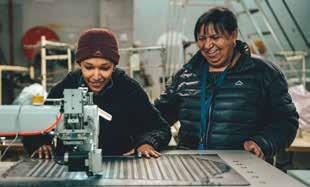
Among TFG’s acquisitions were Prestige Clothing Maitland and Prestige Clothing Caledon. The group then spent R75-million on expanding the factory in Caledon. TFG is ramping up production of clothing and expects to increase staff from just over 3 000 to more than 5 000 in 2023. Cape Union Mart, a well-established brand with a speciality in camping, hiking and other outdoor gear, is the largest unlisted clothing retailer in South Africa. What is less well known is that the company’s subsidiary, K-Way, makes its own products. About 200 staff members at a factory in the Cape Town suburb of Ottery produces 40 000 garments every month.
Electricity usage at the factory has been cut by up to 35% annually by the installation of solar panels. The company is working with UNEP, the United Nations Environmental Programme, to assess its carbon footprint per garment. Waste is reduced by using second-hand boxes to deliver all repairs. Member companies of the Cape Clothing and Textile Cluster have reported hiring 35% more staff in four years. Altogether, about 23 600 people are employed in the province.
In October 2022, Damen Shipyards Cape Town delivered a second sophisticated patrol vessel to the South African Navy. The company is a subsidiary of Damen International Shipyards Group, which recently
Cape Clothing and Textile Cluster: www.capeclothingcluster.org.za
Invest Cape Town: www.investcapetown.com
Western Cape Maritime Cluster: www.wcmc.org.za
Bloomberg reported in 2021 that Paramount Maritime Holdings, a subsidiary of the Paramount Group, was building 26 boats for a combined value of $60-million. This is in response to piracy in the Gulf of Guinea.
Invest Cape Town reports that the city’s boatbuilding industry is the second-largest producer of recreational catamarans in the world, after France. The city’s companies export 80% of the products that they produce and attract a positive trade balance of approximately $73-million annually. Robertson & Caine’s facility in Woodstock produces three boats a week for the international market. With a staff complement of 1 350, the company is a leader in power catamarans and sailing catamarans.
Nautic Africa makes larger vessels, including patrol, defence, oil and gas platform and commercial vessels while companies such as Smit Amandla Marine and De Beers Marine offer a wide range of services. ■
Social housing projects are accelerating in Cape Town.

February 2022 marked a milestone for the R3-billion Conradie Park mixed-income housing project when the first 66 residents received their keys.
Conradie Park (pictured) is a joint venture between the City of Cape Town, the Provincial Government of the Western Cape and the non-profit company associated with Concor Developments, Own Haven Housing Association. Located on the site of the old hospital, the project is well-served by transport lines and lies at the intersection of Pinelands and Thornton. There are 3 600 flats available for various income categories.
Across the city, more than 6 500 social-housing units are planned or in development on 50 sites identified by the municipality. These include parts of the CBD, along the Voortrekker Road corridor and at Salt River, where a 1 800-unit project will deliver 600 social-housing units. In Woodstock, social housing company Sohco has put the 243-flat project out to tender and occupation should take place in early 2024.
The Provincial Government of the Western Cape is in partnership with the University of the Western Cape to deliver more than 2 500 beds for student accommodation. Public comment has been made on a proposed new Inclusionary Housing Framework, which according to the State of the Province Address, “leverages our development planning powers” and aims to increase the number of mixed-use developments in the future.
FNB, which publishes a regular property barometer, has done an in-depth analysis of previous crises to understand the post-Covid property market. According to John Loos, a property strategist at FNB Commercial Property Finance, the most vulnerable sector is likely to be Retail Property. Smaller neighbourhood shopping centres, with more essential items and greater convenience, will be less vulnerable.
The lockdown accelerated the trend for people to work from home, and so the Office Property sector will come under pressure. Many companies will be reducing office space, but this is in fact a speeding up of an existing trend.
At the Victoria & Alfred Waterfront, recovery from the Covid pandemic seems to be progressing well. Having given rental relief to various tenants of more than R350-million, the owners of
Construction Industry Development Board: www.cidb.org.za
SA Institute of Architects: www.saia.org.za
Western Cape Property Developers Forum: www.wcpdf.org.za
the Waterfront, Growthpoint Properties and the Public Investment Corporation, continued to spend on new developments, including a home for South African cuisine at the newly-created Makers Landing, which is located next to the cruise terminal. The project had support from the Jobs Fund.
Plans are being rolled out to add 80 000m² to the available space within the Waterfront’s precincts. Asset manager Ninety One has a new headquarters in the Waterfront and Deloitte has built a 9 000m² office block. ■
New headquarters have been built in the Waterfront.The upgrades to the N7 are moving ahead.
According to the document, 58% of commuters use private vehicles to get to their destinations; 22% use minibus-taxis; 9% use bus services such as the MyCiTi and GABS; 2% use rail (a decline of 95% for the period 2012 – 2022); and about 10% walk.
The ongoing upgrades to the N7 highway which runs up the west coast are bringing economic benefits to the Swartland region. Martin & East were awarded the contract to widen a 25km section of the road near Moorreesburg and subcontracted 30% of the work to small businesses, in line with South African Road Agency’s transformation policies.
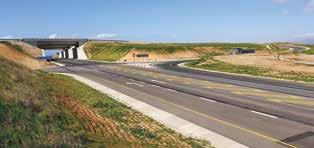
SANRAL started the upgrade of the N7 with the Melkbosstrand interchange in 2012 and has subsequently completed the Hopefield interchange. Altogether eight interchanges have been constructed and 46 major concrete structures built and upgraded. To the end of 2021, R333-million had been spent on “targeted labour” which includes black-owned entities, women-owned businesses, youth-owned businesses and persons with disabilities. A total of R529-million had been spent on SMMEs.
The City of Cape Town conducted a feasibility study in the course of 2022 on taking over the management of passenger rail services from PRASA. The city wants to have a fully-integrated system, which would include rail.
In 2022 the city’s Urban Mobility Directorate published an updated Comprehensive Integrated Transport Plan (CITP), outlining the strategies and plans for improving the transport environment in the metropole for five years to 2028.
A range of new factors were considered in drafting the plan, such as the virtual disappearance of passenger rail as an option, the impact of the Covid-19 pandemic and the new trend towards remote working.
Airports Company South Africa: www.airports.co.za
Passenger Rail Agency of South Africa: www.prasa.com
South African National Roads Agency: www.sanral.co.za
Transport and Urban Development Authority: www.tct.gov.za
The Transport and Urban Development Authority (TDA), located within the municipality, is responsible for planning, costing, contracting, regulating, monitoring, evaluating, communicating, managing and maintaining the City of Cape Town’s transport infrastructure, systems, operations, facilities and network. The provincial government is in the process of following the city’s lead with the establishment of a Mobility Department which will monitor the province’s transport programmes, such as financial support to bus and taxi services, the transport regulation mandate and extensive traffic management operations.
Cape Town International Airport regularly wins awards and is routinely named Africa’s Leading Airport. George Airport now welcomes over 800 000 passengers each year and also serves as a national distribution hub for cargo such as flowers, fish, oysters, herbs and ferns. George Airport is Africa’s first airport to be solar powered. Plettenberg Bay Aerodrome hosts CemAir which flies to and from Johannesburg and Cape Town. ■
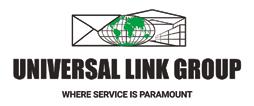
Universal Link Group, established in 1999, is a market leader in the logistics and distribution services sector. We are fast becoming one of South Africa’s leading e-commerce warehousing, order fulfillment solutions driven companies with a BBBEE Level 1 accreditation. We offer access to a comprehensive logistical supply chain service. Our extensive knowledge assures our clients of a smooth process flow and desired outcome.
We provide strategic solutions for all your procurement, courier, e-commerce fulfillment and warehousing, import and export distribution systems designed to meet your requirements. We are an accomplished procurement office, taking the pressure out of your business of finding the best solutions, equipment and assistance to obtaining, locating and implementing your requirements, giving you a competitive advantage and leading edge.
We are a team dedicated to service excellence through the process of simplicity and transparency, making your experience seamless and stress free. We are committed to explore and adapt innovative ideas, that achieve maximum supply chain efficiencies.
• Distribution and Warehousing
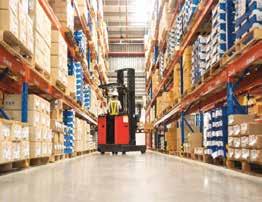
• Domestic and International Courier
• e-Commerce Order-Fulfillment
Contact details
• Inventory Management System
• Pick and Pack Services
• Storage (long-term and short-term)
• Mailing and Distribution Services
• Packaging Solutions
• Pharmaceutical Distribution
• Wine Storage and Distribution
WAREHOUSES
• Cape Town: 1 170m²
• Johannesburg: 350m²
• Flexible storage options, including heavy-duty racking, a high-value goods area and freeflow areas.
• Storage methodology eliminates errors by not shelving like products together, making picking easier.
Unit 22, 31 Junction Road, Tygerberg Junction, Parow Industria 7493 Tel: 021 951 4200 | Cell: 063 575 3447 | Email: info@ulgroup.co.za | Website: www.ulgroup.co.za
Air Belgium has started flying to Cape Town.
flying between Brussels and Cape Town and for the first six months of 2022, 500 tons of air cargo were flown between the two destinations.
Grand Parade Investments (GPI), which has sold some of its non-core assets such as Burger King, will delist from the JSE. The company intends to exit the gaming business where it has a minority share in Sun Slots, which operates limited payout machines (LPM). GPI is a shareholder in companies that operate casinos in the Western Cape and, with a 15% stake in SunWest International, GPI is connected to the Table Bay Hotel and the Cape Town International Convention Centre.
The landing of an Air Belgium jet at Cape Town International Airport in September 2022 was significant in several ways. The Airbus on the runway signalled that the Access Cape Town campaign, an initiative to entice airlines to Cape Town, was back on track and it opened up the possibility of increased numbers of tourists and goods moving between the city and Belgium.
Air Access created more than 750 000 new inbound seats between its inception in 2015 and 2020, adding something like R6-billion to the provincial economy.
Belgium is the Western Cape’s seventh-largest European export market, with R2.61-billion in goods exported in 2021, up 81.5% from 2020. The first flights of Air Belgium will not be direct to Cape Town, but as volumes increase it is expected that Cape Town will get its own direct flight. Two-way passenger traffic showed a 50% recovery for the first six months of 2022, with 8 300 passengers
Cape Nature: www.capenature.co.za
Garden Route and Klein Karoo: www.visitgardenrouteandkleinkaroo.com
George Tourism: www.georgetourism.org.za
WESTERN CAPE BUSINESS 2023
While the air travel news showed that Covid is starting to recede as a factor, the Western Cape wants to build on the reputation it built up during the pandemic as a good destination for remote working. This is another motivation behind the provincial government’s support of digital connectivity.
The Western Cape Provincial Government wants to promote education in the arts. Based on research which found that 6% of employment in South Africa is in the cultural sector, the Western Cape will expand the traditional STEM emphasis to include two additional As: Arts and Agriculture. There are 60 000 people employed in the culture sector in the province.
A landmark on the Sea Point boulevard, the Winchester Hotel, reopened in 2021 after new owners Newmark spent R90-million on a major revamp. Having been built to house residential apartments, what became Winchester Gardens was famous for its jazz and Sunday teas. The 76-room hotel is now a luxury boutique hotel. ■
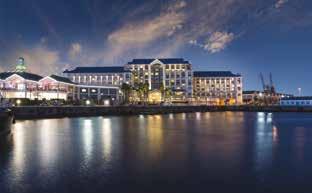
House of Kreationz is a leading events décor styling company, with branches in the Western Cape and Gauteng. Our extensive client-base of brands and companies includes trendsetters and leaders in their respective fields.

Through the collective team we possess a wealth of experience that spans over 20 years. The company focuses on high-end event styling, conceptualising and curating each event into a unique experience. No job is too big or small for our team of creative event planners, meticulous coordinators, resourceful project managers and problem-solving thinkers,
Started shortly after the devastating global pandemic, the birth of House of Kreationz was a huge leap of faith. Kreationz, as we are commonly known, wasted no time in filling a vacuum in the events industry. The events market needed an injection of innovative
BBBEE Level: 1
Key contact people:
1. Franco Beginsel Position: General Manager
2. Rufus McCarthy Position: Operations Manager
3. Natalie Koopman Position: Director
ideas, fresh creativity and a spiced-up services offering that would leave clients with an event experience that will be talked about long after the last chair is packed away and every power cord is rolled up.
The Kreationz offering is more than just contemporary event styling – the company’s alliances and contacts ensure a seamless turnkey project management solution.
Our overall offering includes, but is not limited to, event conceptualization and styling curation, management, co-ordination, production and planning.

Kreationz boasts a clientele that includes major clients like the CSIR, Big Concerts, ZA Fanzone, GPA Group, Mushroom Productions, Black Creatives, NCPC-SA and Travel with Flair to name but a few.

Physical address: 10 Banchory Road, Blue Valley Golf Estate, Kosmosdal, Centurion
Tel: 010 157 3266 Cell no: 072 858 7870
Email: franco@kreationz.co.za / ops@kreationz.co.za
Postal address: 10 Banchory Road, Blue Valley Golf Estate, Kosmosdal, Centurion
Website: www.kreationz.co.za
Digital skills are in demand.
The Minister of Higher Education, Dr Blade Nzimande, was on hand in October 2022 to officially open the CHIETA SMART Skills Centre in Saldanha Bay (pictured). The Chemical Industries Education and Training Authority, which reports to the minister, aims for the R3-million facility to help citizens learn digital skills.

The Provincial Government of the Western Cape has invested more than R1.6-billion in e-learning over the last five years in response to Covid and the demands of remote learning. A total of 1 290 schools within the province now have broadband connectivity and there are 1 316 with computer labs and 9 992 smart classrooms (SOPA).
Ten new schools were successfully completed in 2020/21, which has led to about 1 100 new teachers being employed.
The province’s I-CAN centres allow for public access to digital skills programmes, WiFi and business services. The centres are divided into zones (including Create, Study and Learn) and printing, graphic design and laminating services are available.
The University of Cape Town joined the trend with the creation of an online high school. The school hopes to close the opportunity gap for poor students in under-resourced areas.
The University of Cape Town has more than 21 500 students, 720 permanent staff and 39 A-rated researchers (40% of South Africa’s total). Stellenbosch University is linked to Stellenbosch’s growing reputation as a technology hub. The University of the Western Cape is home to several national research bodies.
These three institutions, plus the Cape Peninsula University of Technology, produce approximately 12 000 science, technology, engineering and mathematics graduates every year and host 11 000
students from other African countries. University education is available in George through the Nelson Mandela University (NMU): Saasveld is home to the School of Natural Resource Management and the York Street Campus delivers courses in business and social science, accounting and business management.
SARETEC offers industryspecific training in a new economic sector. The South African Renewable Energy Technology Centre is managed by the Cape Peninsula University of Technology (Bellville campus) but it collaborates with several other institutions and private companies.
Unisa, the country’s biggest distance learning institution, has a campus in Cape Town and a service centre in George.
Airports Company SA (ACSA), the City of Cape Town and the False Bay TVET College in Westlake have combined to offer residents of Blikkiesdorp a chance to learn skills in brick-laying, house-building, scaffolding and health and education. ACSA is investing R5-million in the 12-month certification project and the Construction Education and Training Authority (CETA) will channel funds to False Bay College for training.
In 2022 the College of Cape Town Hospitality Department was invited by the Kofler Group
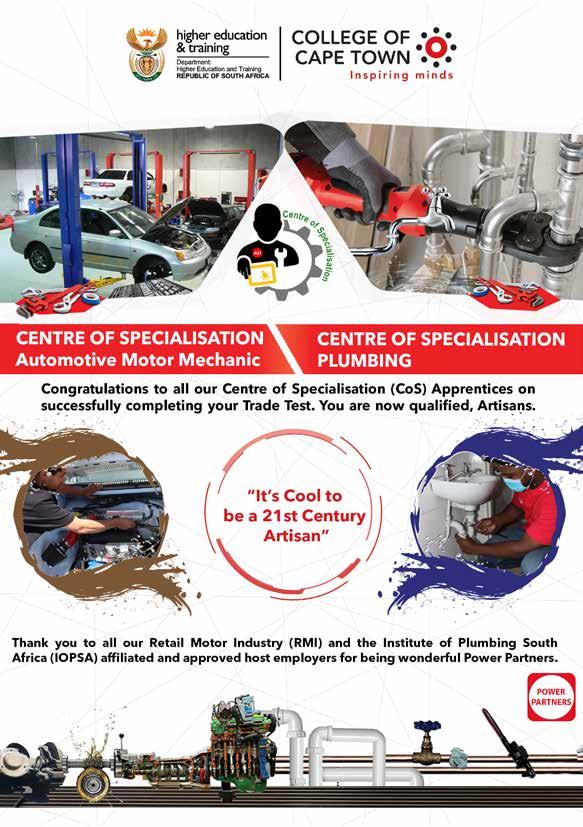
Middle East LLC to select four N6 Hospitality and Catering Services students to apply for an opportunity to work as Front of House Facing Commis Chefs at the 2022 FIFA World Cup. All of the students were from the City Campus and spent all of November and half of December in Doha.
A Centres of Specialisation Programme has been introduced by the Department of Higher Education and Training to tackle priority skills. The College of Cape Town TVET concentrates on plumbing and automotive motor mechanics. A welding academy in Thornton has been opened with support from the merSETA (Manufacturing, Engineering and Related Services SETA).
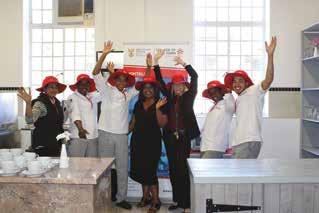
Outside of the Cape metropole, Boland College looks after Stellenbosch, Worcester, Paarl and Caledon, while the Southern Cape College covers a wide area, from George to Beaufort West. The West Coast College also has a big catchment area.
The Western Cape Department of Infrastructure is rolling out a skills programme for young people in prison. The focus is on technical skills in the built environment.
Apprenticeship Game Changer: www.westerncape.gov.za
Centres of Specialisation: www.dhet.gov.za
SA Renewable Energy Technology Centre: www.saretec.org.za
TVET colleges: www.tvetcolleges.co.za
Woodstock and Salt River are increasingly trendy destinations, something that is encouraged by tax rebates and other incentives to new businesses willing to open in that part of Cape Town that used to be an industrial and transport hub. Two savvy business organisations that have taken up new premises in the area are the Henley Business School and the Regent Business School.
Henley Business School will offer four of its accredited qualifications, three at undergraduate level, and its honours-level Postgraduate Diploma in Management Practice, from its new Brickfield campus in Woodstock. The new campus will also host the school’s executive education and customised programmes for its Cape Townbased corporate clients.
Support will be offered to Cape Town students studying for the Henley MBA programme, but they will continue to be registered with the Johannesburg campus and any physical sessions related to the course will still be held in Gauteng. Most of the MBA work is done remotely.
Regent Business School opened its new Cape Town campus in The Boulevard Office Park, Woodstock, in January 2023. In addition to the courses offered by the school, students are promised full access to the iLead lab and Black Umbrellas business incubation hub, entrepreneurial skills and assisting with funding and opening a small business. The Mayor of Cape Town Mayor Geordin Hill-Lewis spoke on the occasion of the launch on the topic, “New age teaching for the leaders of tomorrow”. ■
The Shaping Futures Foundation matches corporate donations to tertiary institutions to assist worthy students.
Kayne, CPUT: I just wanted to thank you wholeheartedly for extending a helping hand when I needed it the most. I am studying Information Technology at the Cape Peninsula University of Technology.
Since its founding in August 2017, the Shaping Futures Foundation has raised in excess of R11.5-million and provided financial assistance to more than 150 students in tertiary education.

It also currently administers a school feeding scheme providing daily meals to 2 800 underprivileged learners. The Shaping Futures Foundation has assisted students in KwaZulu-Natal, Gauteng and the Western Cape.
With a background in finance, John de Groot spotted a mismatch in March 2017 between talented students either not graduating or not progressing in their studies because of a lack of funds on the one hand, and companies with money to spend in terms of BBBEE legislation but without the time or resources to find the deserving students who needed funds.
The Shaping Futures Foundation was created to match these parties and its success over the years has proved the truth of John’s observation.
Although his involvement in the foundation is now as a non-executive director, John still derives enormous joy from the knowledge that the foundation is making a meaningful impact in the lives of students in need. Letters of appreciation are regularly received from students outlining the significant impact the Shaping Futures Foundation has had on their lives.
Zainub, UCT: I am truly honoured to be one of the recipients of the Shaping Future Foundation bursary. Thanks to your support I will be the first in my family to possibly acquire a tertiary education. Thank you for investing in my dream of achieving a degree in computer science and computer engineering.
Says John, “There have been occasions where we have managed to completely settle students tertiary education debt, allowing them to start their post-graduate lives without the hinderance of student debt.”
Donations to the Shaping Futures Foundation qualify as skills development expenditure and an 18 (A) tax certificate can be issued. The latest BEE codes encourage expenditure of between 3% and 6% of a company’s payroll for companies with turnovers between R10-million and R50-million per annum. The Shaping Futures Foundation ensures this spend is allocated efficiently and to the correct demographic profile. Established relationships with tertiary institutions make for synergies and could lead to hiring opportunities, which in turn attract more points for companies.

The Shaping Futures Foundation Board
Members are all Chartered Accountants: John de Groot; Chloe Arkcoll; Mzi Nkonyeni. ■
Address: 5 Cornwall Place, Wynberg, Cape Town, 7800 Mobile: +27 82 776 5907 | Email: chloe@shapingfutures.org.za | Website: www.shapingfutures.org.za
The Business Hub is a City of Cape Town initiative that gives advice to entrepreneurs. In the first six months of 2022, 973 entrepreneurs participated in skills training offered by the Hub. The Hub partners with Productivity SA and the South African Renewable Energy Incubator in promoting SMMEs.
Access to the Hub is free via Smart Cape Services at libraries in the city or where free Wi-Fi is provided in all city-run buildings.
Another initiative to help entrepreneurs engage with the digital world was launched in 2022 by Silicon Cape and Huawei Cloud. Silicon Cape is a non-profit initiative that supports the creation of a sustainable tech and entrepreneurial ecosystem. Huawei Cloud showed 20 entrepreneurs how to accelerate the growth of their companies through cloud adoption.
Philippi Village (pictured), an integrated, mixed-used development, is proving a successful host to a number of dynamic small enterprises. Established by the Bertha Foundation and The Business Place Philippi and with seed funding from the Jobs Fund, it is currently home to more than 80 tenants providing products, services and training opportunities as well as job opportunities to the local community. The sports facilities and other amenities ensure that there is constant activity and a buzz within the development with locals feeling a sense of ownership.
In his 2022 State of the Province address, Premier Alan Winde quoted from the Global Startup Ecosystem Report 2021, which stated that Cape Town is the number one performer in Africa for technology ecosystems and is home to almost two-thirds of all start-ups in South Africa. Winde announced the creation of an SMME Booster Fund which will support organisations that provide business development support.
Two of the Western Cape’s universities, Stellenbosch and Cape Town, are among the first collaborators with the University Technology Fund which aims to commercialise innovations and inventions coming out of tertiary institutions. The UTF has financial clout as it is a part of the South African SME Fund, an offshoot of the CEO Initiative which brought

Invest Cape Town: www.investcapetown.com
SA SME Fund: sasmefund.co.za
Small Enterprise Development Agency: www.seda.co.za
Small Enterprise Finance Agency: www.sefa.org.za
together 50 major corporations, the Public Investment Corporation, the Unemployment Insurance Fund and the Compensation Fund. Among the businesses receiving support from the SA SME Fund is Hyrax, a company which emerged from research done at the University of the Western Cape into which HIV-positive people were resistant to certain drugs.
The National Department of Small Business Development (DSBD) has several programmes to assist SMMEs and co-operatives. The Small Enterprise Development Agency is an agency of the DSBD and gives non-financial support to entrepreneurs through training, assistance with filling in forms, marketing and creating business plans. ■
International brands are choosing Cape Town.
“We are Africa’s BPO Capital,” says provincial Premier Alan Winde of the Western Cape.
Rob Kane, chairman of the Cape Town Central City Improvement District (CCID), a public-private partnership and non-profit organisation that is mandated to manage and promote Cape Town’s central business district (CBD), is even more specific: “Downtown Cape Town is a recognised technology, BPO and e-commerce hub, with reliable infrastructure, fast Internet speeds and a commitment to supporting a young workforce. The city is home to the most tech start-ups on the African continent, and the BPO sector supports call centres for global companies and online retailers with a steady pipeline of call-centre employees.”
Ian Ohlson, a director at Lufthansa InTouch Cape Town, which has been in the inner city since 1999 and has a staff complement of 573, says, “We chose the CBD due to the various options available for transport, the close proximity to shops, banks and lifestyle options.”
Many BPO businesses are part of the CBD’s night-time economy, which includes a vibrant First Thursday night when art galleries and museums open their doors and the town comes alive.
Cape Town hosts 60% of the country’s BPO centres, employing more than 50 000 workers. In 2022 it was also rated the most sustainable city in Africa in the Corporate Knights Sustainability Cities Index 2022 report, noted for its efforts in terms of air quality, emissions, solid waste generation and sustainable policies, among others. Currently there are 69 information and communication tech companies in the Cape Town central business district (CBD) alone, of which 25 are call centres. Included in this number are international brands like e-commerce giant Amazon, Lufthansa inTouch and Global Load Control.
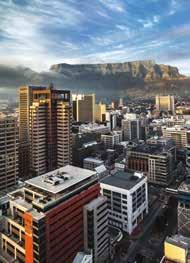
Significantly lower costs than European competitors and growth rates in the Business Process Outsourcing (BPO) sector that outstrip the global rate make the Western Cape an extremely competitive destination. According to the Everest Group Study (2018), Cape Town’s costs for contact centre work are between 20% and 30% lower than the costs in Eastern and Central Europe.
Business Process enabling South Africa (BPeSA): www.bpesa.org.za
Contact Centre Management Group: www.ccmg.org.za
National Department of Trade, Industry and Competition: www.dtic.gov.za
South Africa’s BPO industry is growing twice as fast as the world’s and three times faster than India and the Philippines (Invest Cape Town).
Inbound customer service (55%), inbound sales (15%) and debt collection (13%) comprise the biggest subsectors of the BPO sector in the Cape (Wesgro).
Greater Cape Town is home to three universities, a university of technology and several technical colleges. Other factors in favour of the area are the relatively neutral accents, good financial and telecommunications infrastructure and the time zone being the same or close to Europe’s. ■
Sanlam, established in 1918 as a life insurer, is now a financial services company with five main divisions, including Corporate, Personal Finance and Emerging Markets. Santam focusses on short-term insurance. With its headquarters in Bellville, Sanlam is Africa’s largest insurance company.
Sanlam Investments has launched a Sustainable Infrastructure Fund which primarily invests in senior or subordinated debt across a wide range of South African infrastructure assets, with the ability to invest up to 10% in equity.

The South African state has promised a huge infrastructure drive but in the context of climate change, the investment community is increasingly putting emphasis on sustainability. Sanlam Group will invest R6-billion in the fund and aims to attract a further R5-billion from institutional investors. Investments will be made in housing, transport, health, water, waste, communication, conventional energy and renewable energy, a fast-growing sector with enormous potential.
The Western Cape’s evolution into a technology hub is one of the reasons why one of South Africa’s newest stock exchanges chose to move to the Cape and rebrand as Cape Town Stock Exchange.
This trend is also persuading banks, insurance providers, asset managers and venture capitalists to choose to relocate. There are more than 40 000 jobs in the technology sector (more than double the total of Nairobi and Lagos combined, Wesgro) and formal employment in the financial sector exceeds 50 000.
Together with business services, the financial sector comprises the
Financial Sector Conduct Authority: www.fsca.co.za
Insurance Institute of South Africa: www.iisa.co.za
South African Institute of Chartered Accountants: www.saica.co.za
biggest contributor to the provincial economy. According to Wesgro, 75% of the venture capital deals that happen in South Africa originate in the Western Cape. Most financial firms based in Cape Town have a long history, some going back as far as 1845 when Old Mutual started. One of the most successful disruptors in recent times has been Stellenbosch-based Capitec Bank.
The African Institute of Financial Markets and Risk Management (AIFMRM) aims is to meet the demands for skills by developing local talent. It is supported by the Western Cape Provincial Government, the University of Cape Town, Barclays Africa Group, FirstRand and Liberty.
The head offices of financial firms are dotted all over Cape Town. These include Old Mutual and Foord (Pinelands), Futuregrowth and Coronation (Newlands), Prudential (Claremont), Sygnia (Green Point), Sanlam (Bellville) and Allan Gray (Waterfront). PSG has its headquarters in Stellenbosch and is well represented in rural towns. Insurers such as Santam and Metropolitan Life are based in Bellville. Nomura, a Japanese financial holding company, has a presence in the Cape through Nomura South Africa which offers investment banking services. ■
The Cape Town Stock Exchange is in Woodstock.1999: Getting SA talking
Frequently controversial, and always on the side of young people, loveLife captured the imagination of a generation growing up in the thick of the largest HIV epidemic on earth by making public one of the most taboo topics: sex.
2000 to 2003: Building cutting-edge programmes

loveLife combined a celebrated and controversial multimedia campaign with in-school programmes led by dynamic young leaders – better known as loveLife groundBREAKERs.The loveLife Games School Sports programme brought excitement to every corner of the country, specific programmes for parents, an exceptionally busy Contact Centre, and a host of community based activities including support of other non governmental organizations. In 2003, loveLife’s “Everyone he’s slept with, is sleeping with you” billboard became its most popular.
2008 to 2011: A brave new world

By 2008, new infections among young people aged between 15 to 24 had been halved – but trends in HIV infection showed a need for targeted campaigns toward marginalised youth most affected by the ailing economy. Through innovative interventions like Foxy Chix and MYMsta, the “NAKANJANI” campaign promoted a spirit of resilience among youth.
2015: Powering the FUTURE loveLife’s new focus is unlocking the power of youth leadership for HIV prevention. loveLife has focused on unlocking the power of youth leadership for Youth Health throughout its existence. The next phase development is all about using that youth leadership as the dynamo future growth and sustainability. The loveLife vision moving forward is “A better future powered by the energy and idealism of young people’. This means that we are building on insights of our evaluation (published 2013) by the Human Sciences Research Council
(HSRC). This study showed that while loveLife programmes have an impact, young people concerns are broad and serious. Many young people internalise their failure when they struggle to access opportunities after school. This situation could be reversed, as young people have the ability to substantially change the environment in which they find themselves. Our response is to create bridges of opportunity for all young people. The infrastructure of loveLife programmes has been revamped to deliver a new proposition to young people: a proposition that we spell out as POWERING THE FUTURE.
2004 to 2007:






Growing our reach Research conducted by the Reproductive Health and Research Unit showed interaction with loveLife lowered odds of HIV infection, resulting in an intensive roll-out of the groundBREAKER programme. This painted an optimistic picture for SA youth and messaging steered toward achieving this brighter future a reality with “love to be there” campaign.
2012 to 2014: Focusing on our strengths
By 2012, loveLife was the largest schools-based social change programme in the country! loveLife used this opportunity to reposition itself so that it remained relevant to SA youth.
2017: lovelife’s Vision

Positioning itself as a leader in Youth Health Promotion, lovelife envisaged to promote social activism for Healthy & Active Lifestyle and HIV consciousness amongst youth.



2018: loveLife launches the BoyChild initiative, boys with a total sense of physical, mental and social well-being are key to safe communities.
2019: loveLife turns 20 years, a milestone achievement as it celebrates two decades of being an important contributor to empowering the lives of South African youth.
2020: lovelife carves a niche for in Digital Media by providing programme content in the midst of the COVID19 pandemic.






For some, a career is a comfort zone. Not for you. You don't want to stand still. You want to stand out. You don't just accept your future. You want to shape it. And help ignite the future of others.

Momentum is hiring! So, talk to us about a career in financial planning. And let us show you how to ignite your progression.
Scan the QR code to apply!
